Full text
PDF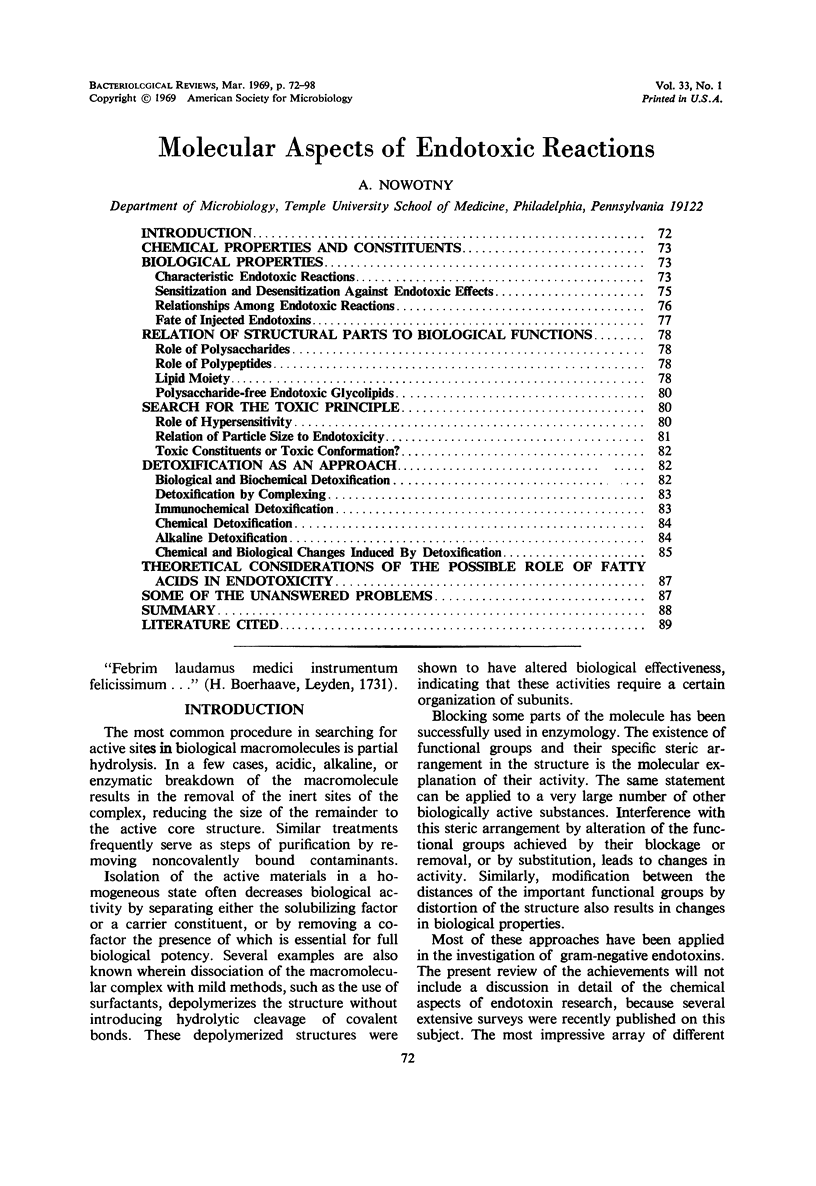
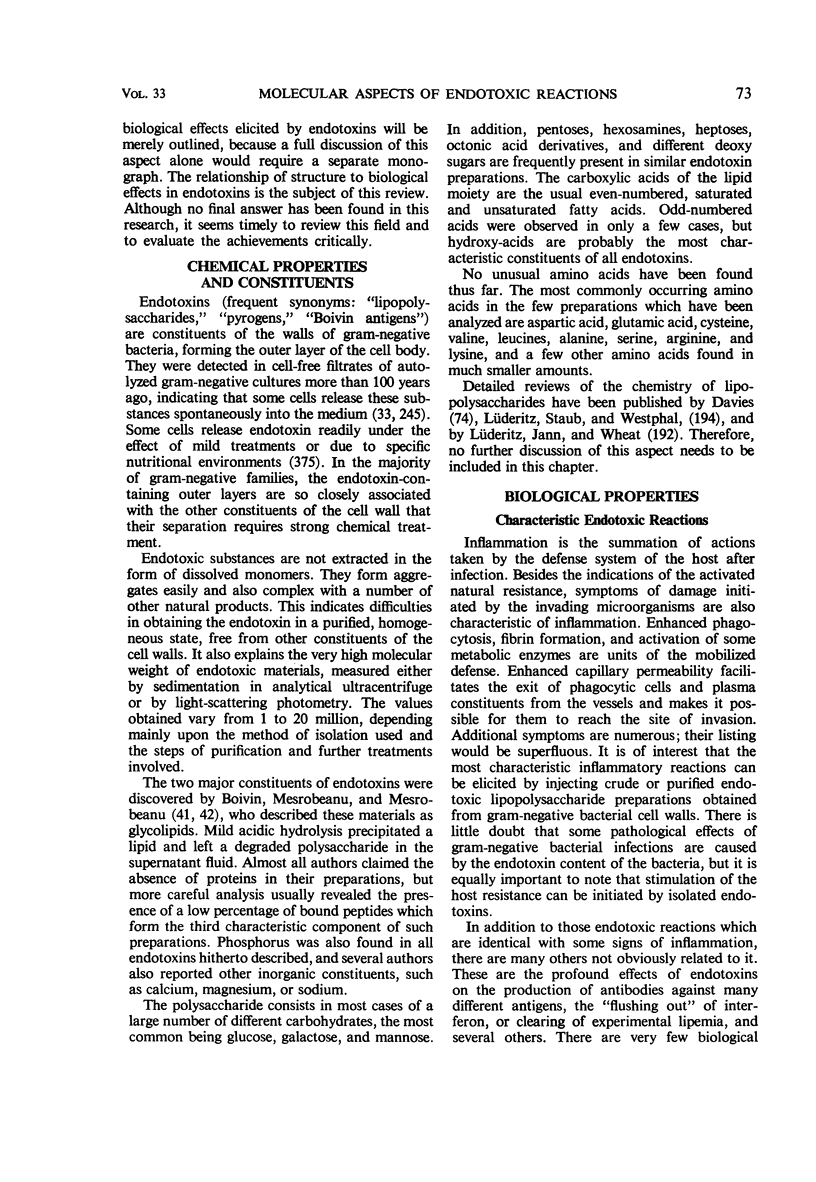
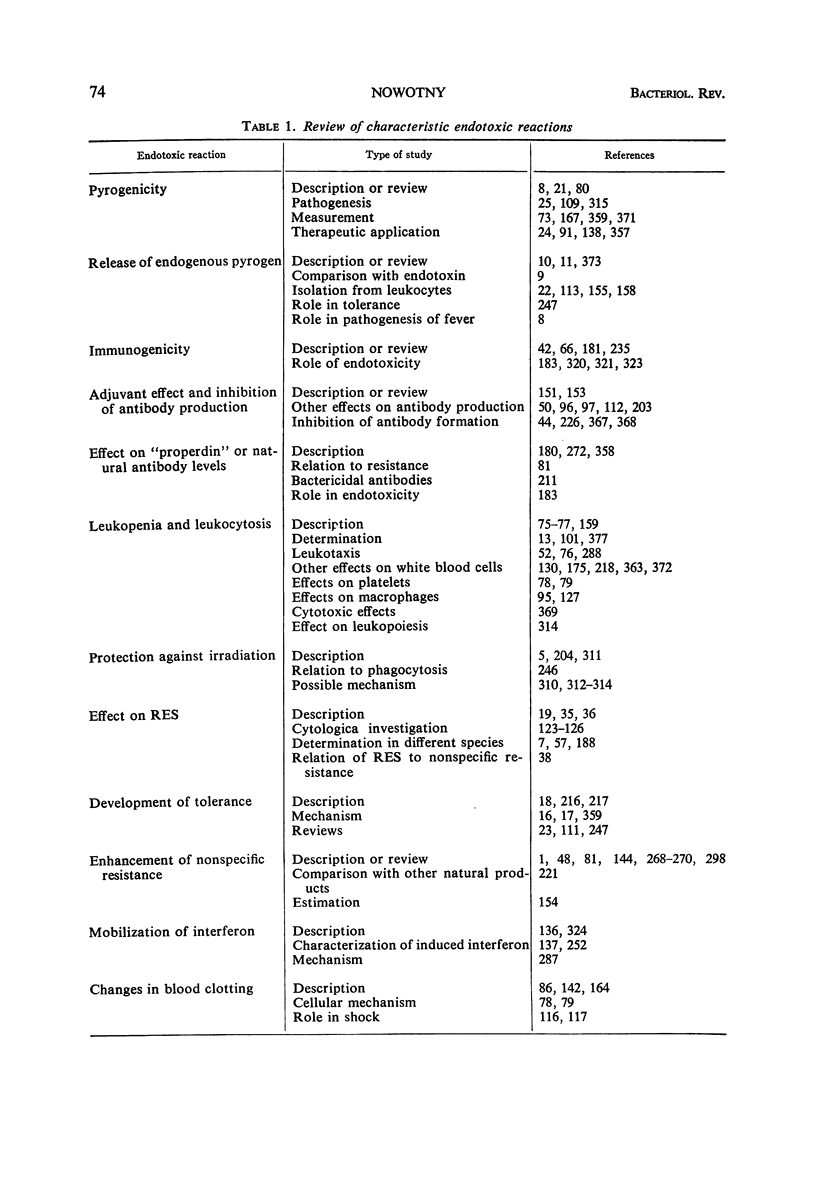
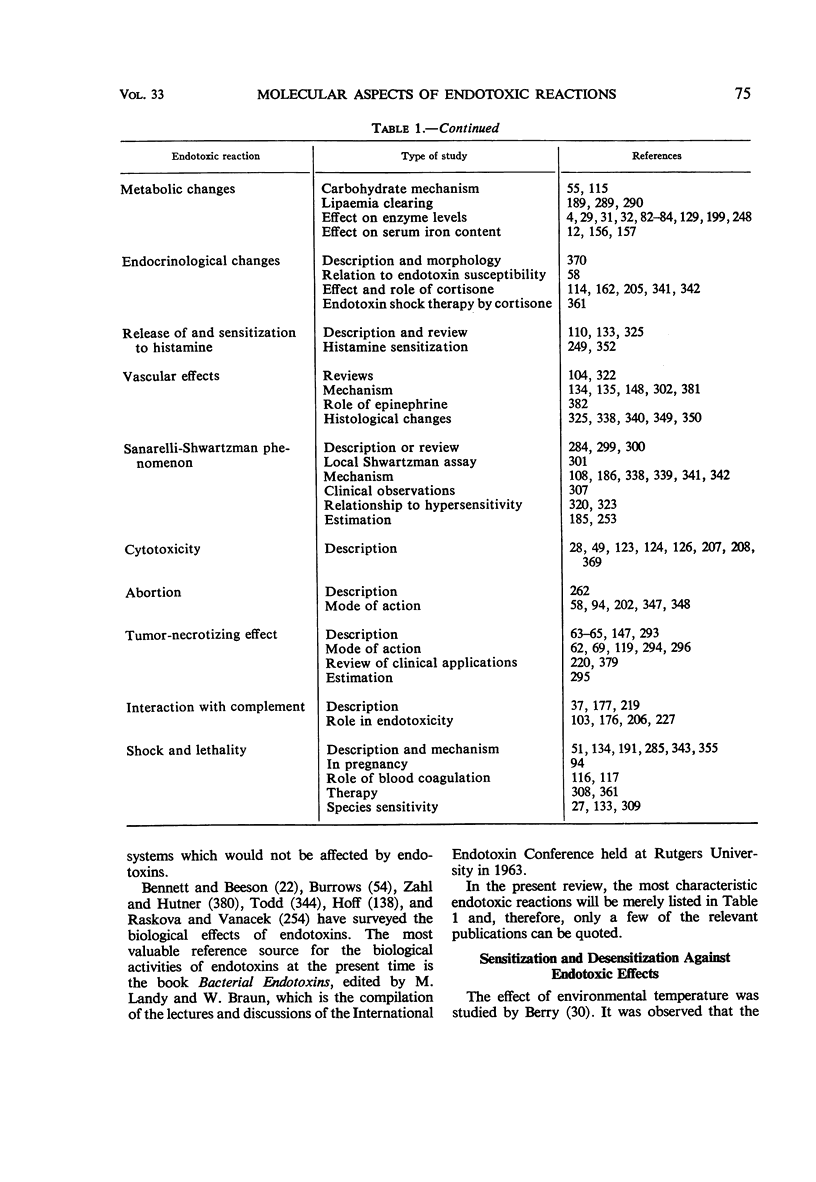
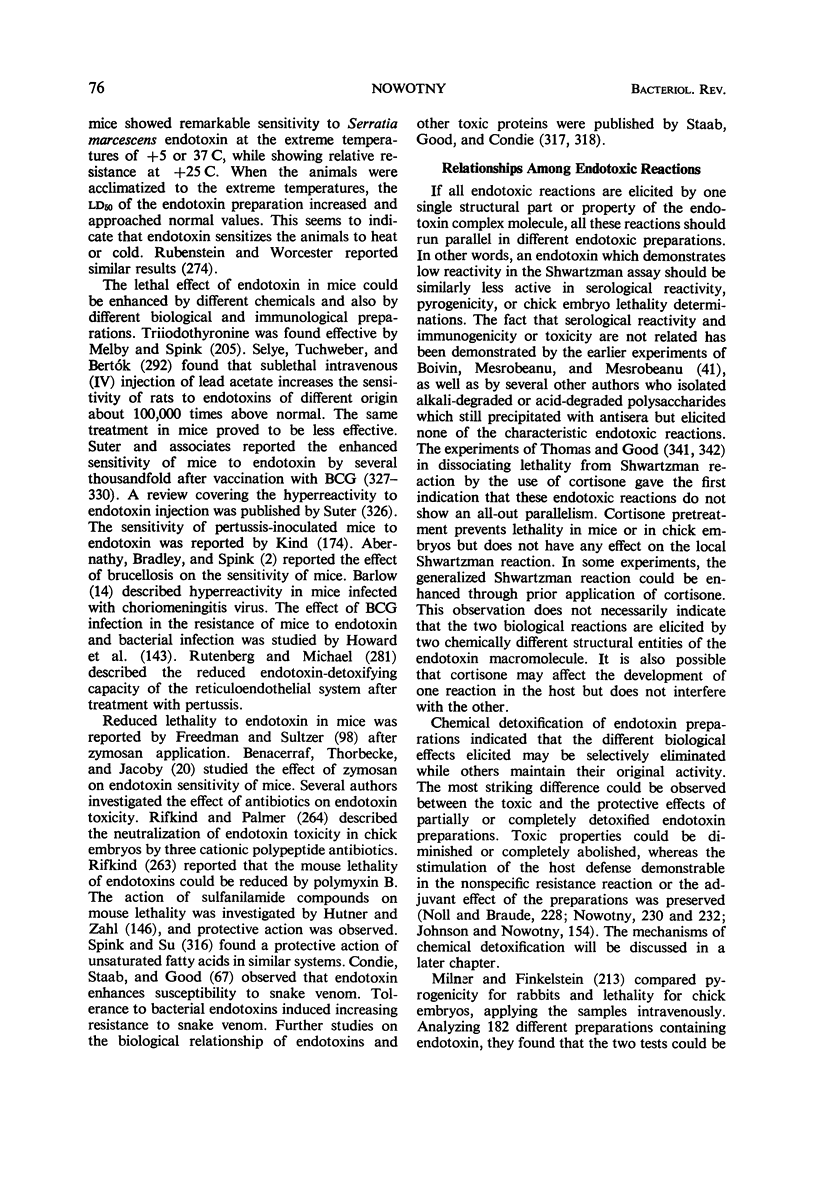
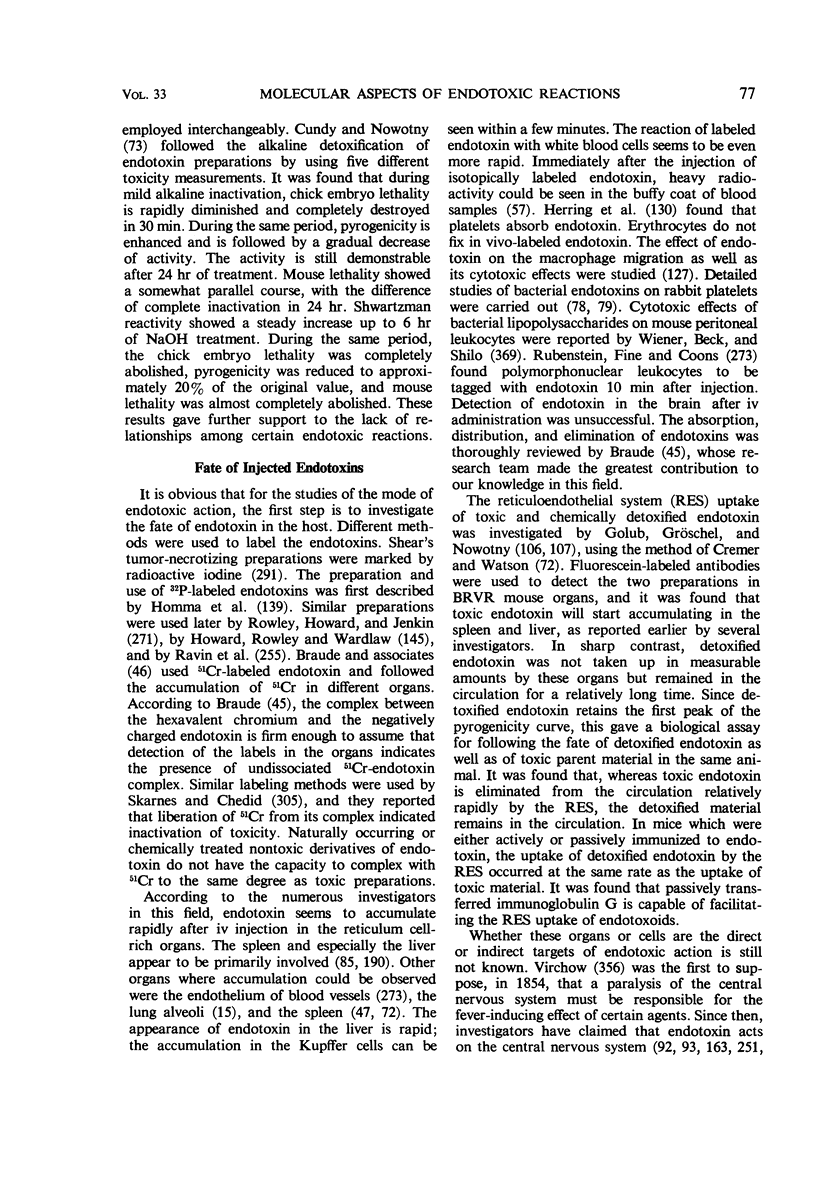
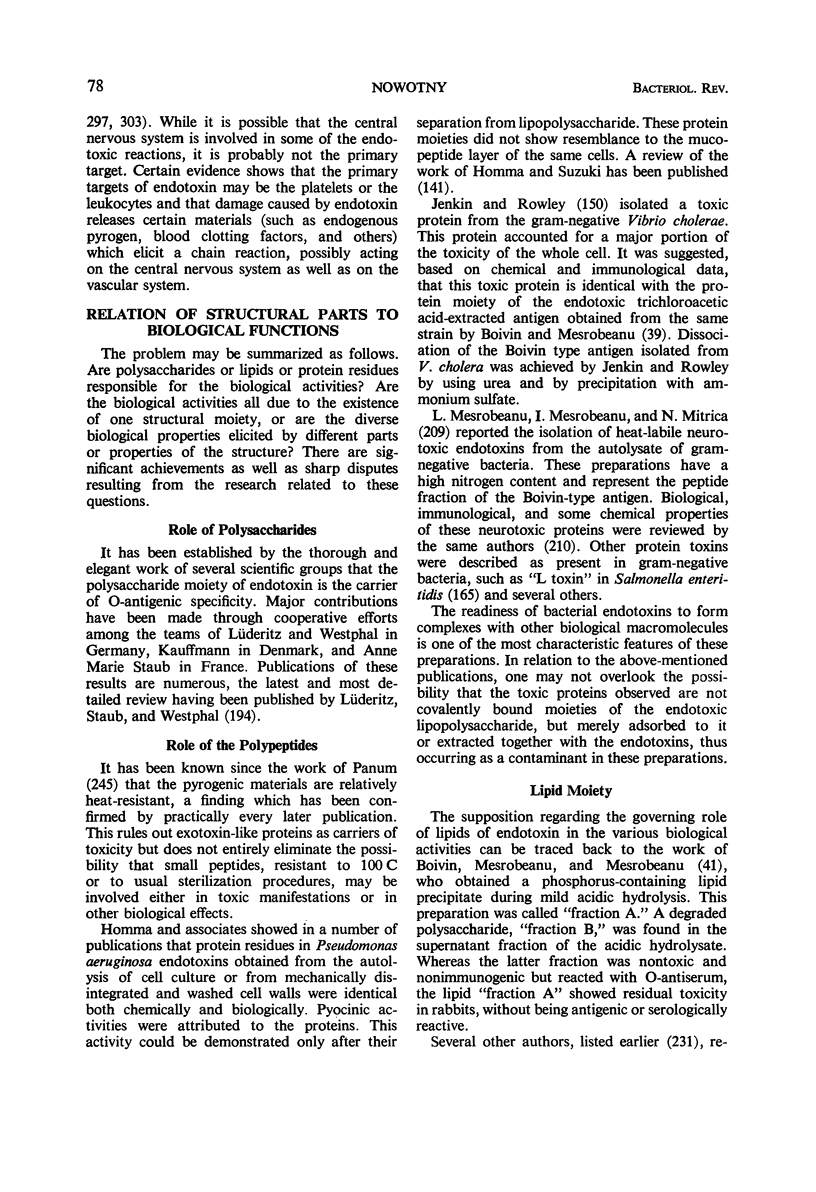
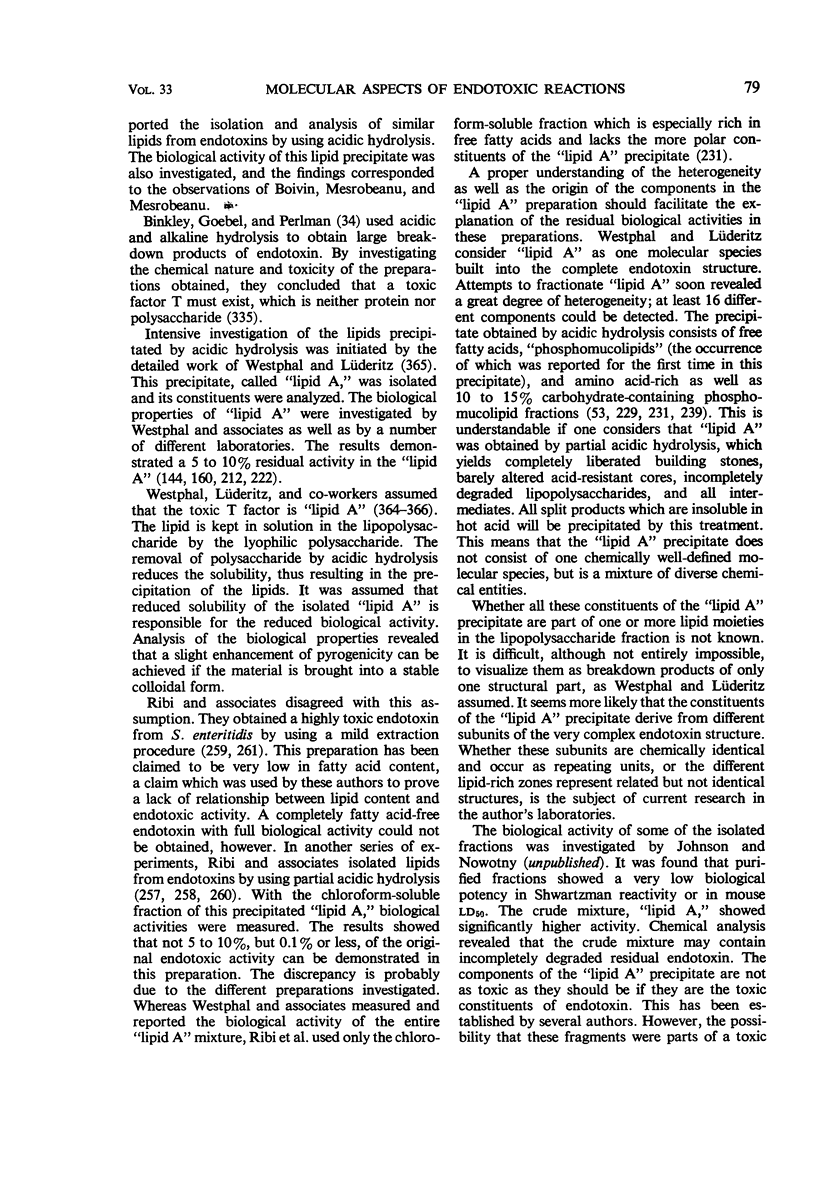
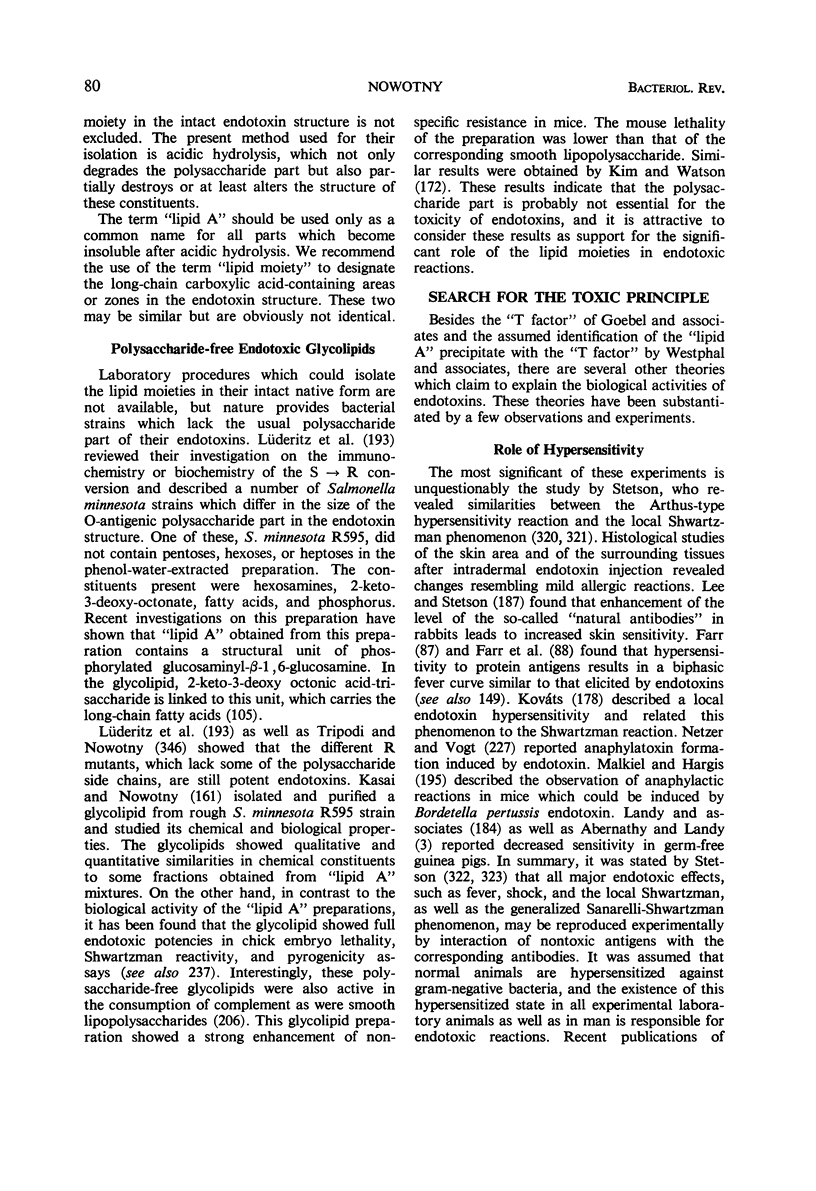
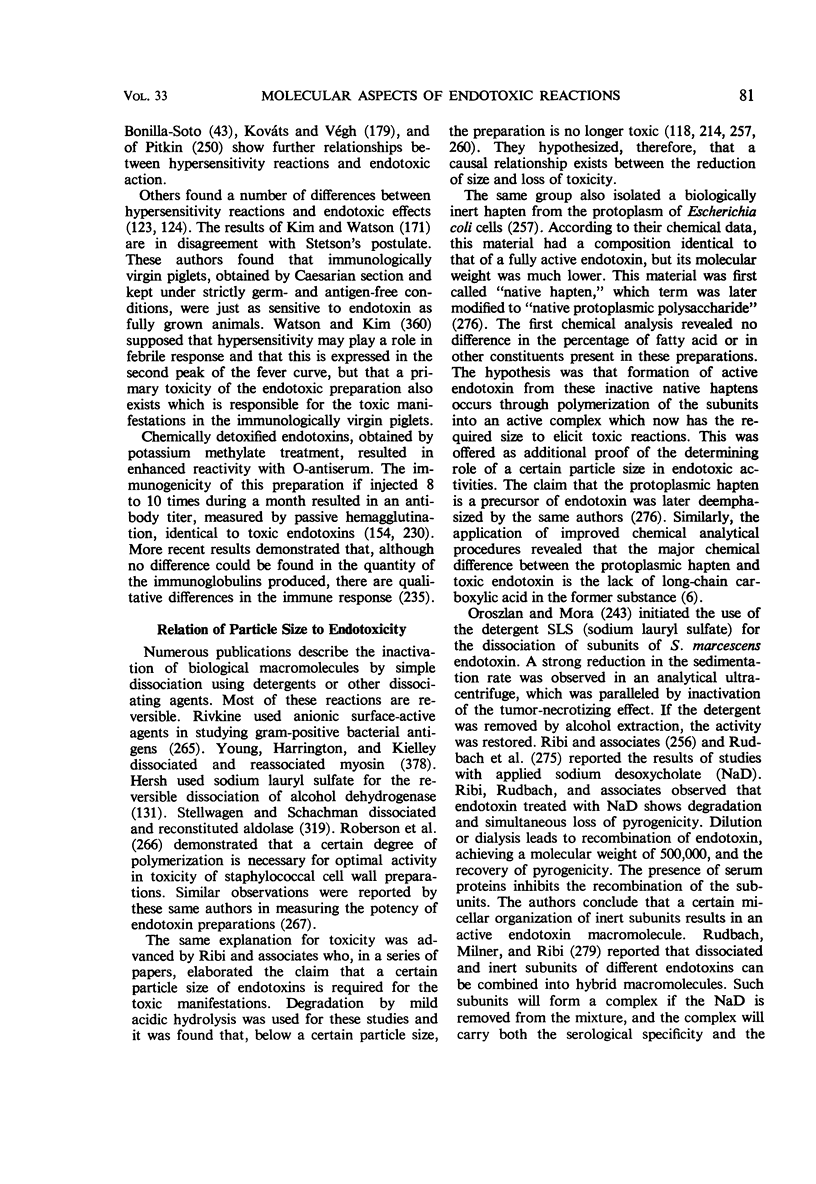
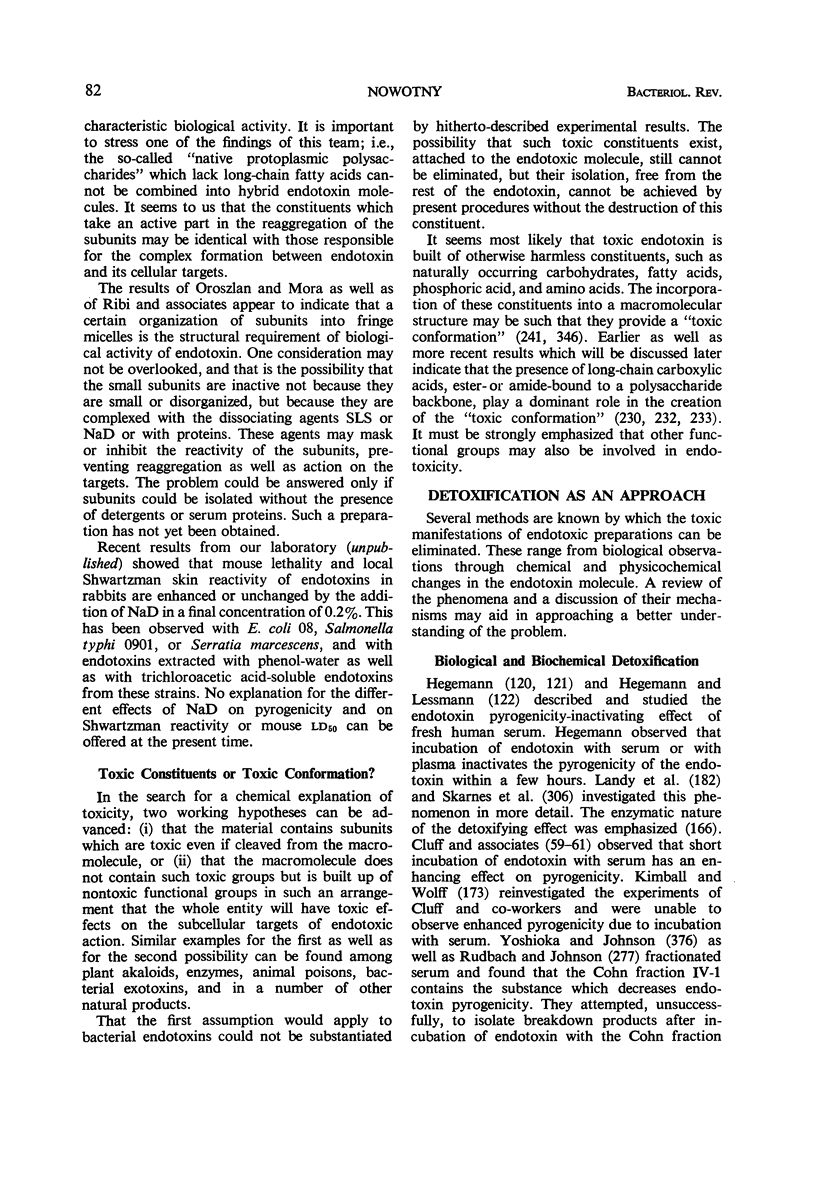
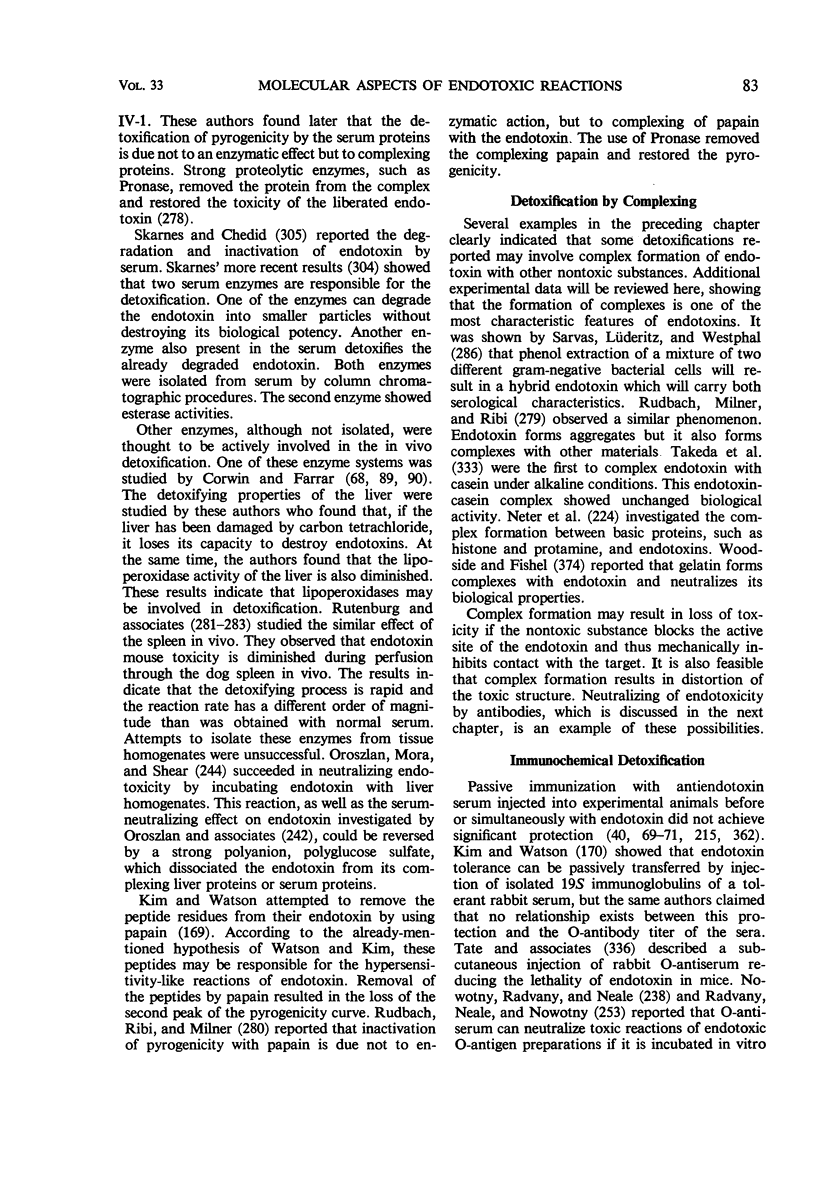
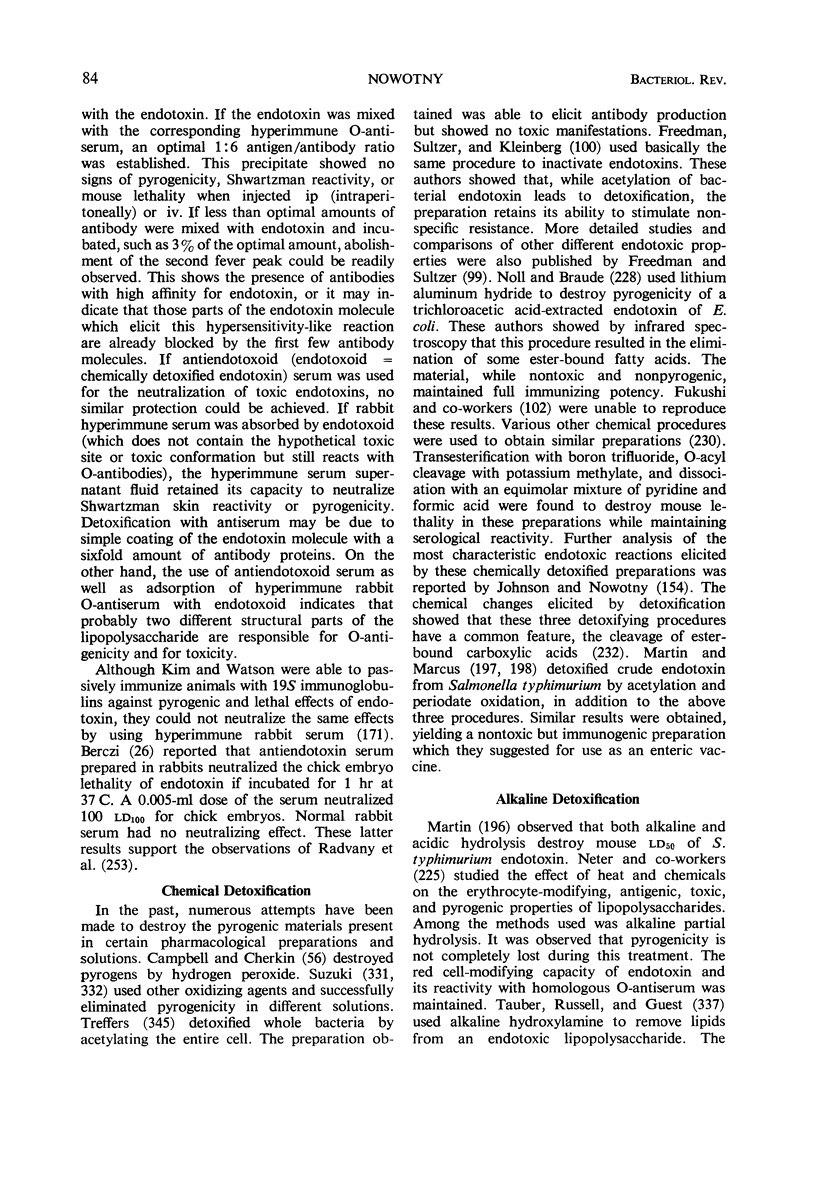
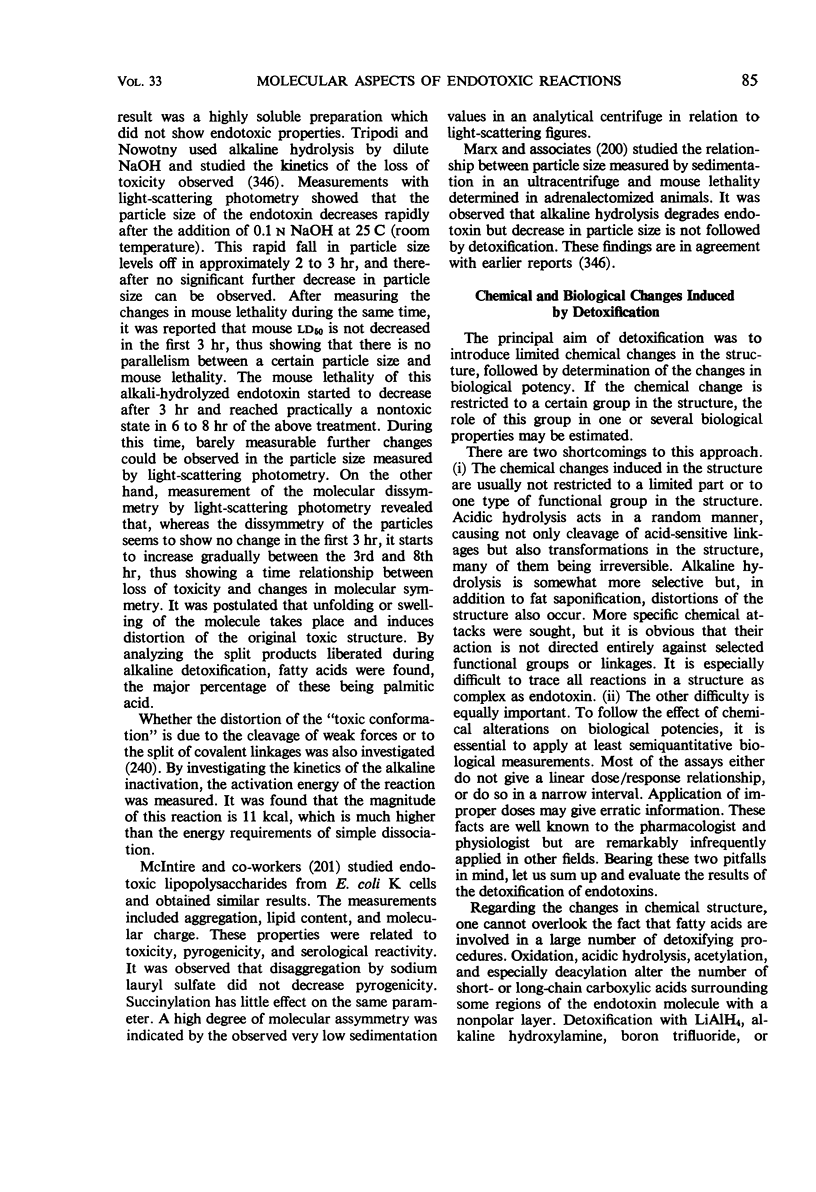
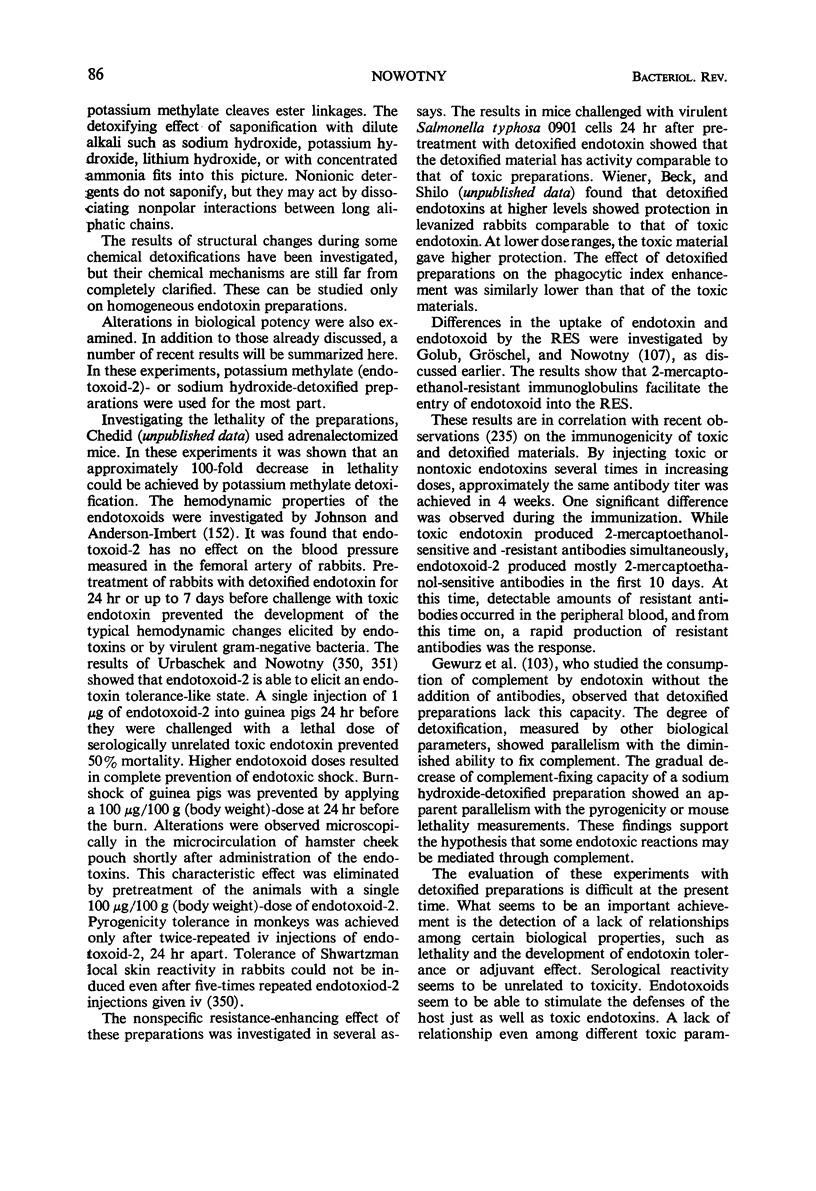
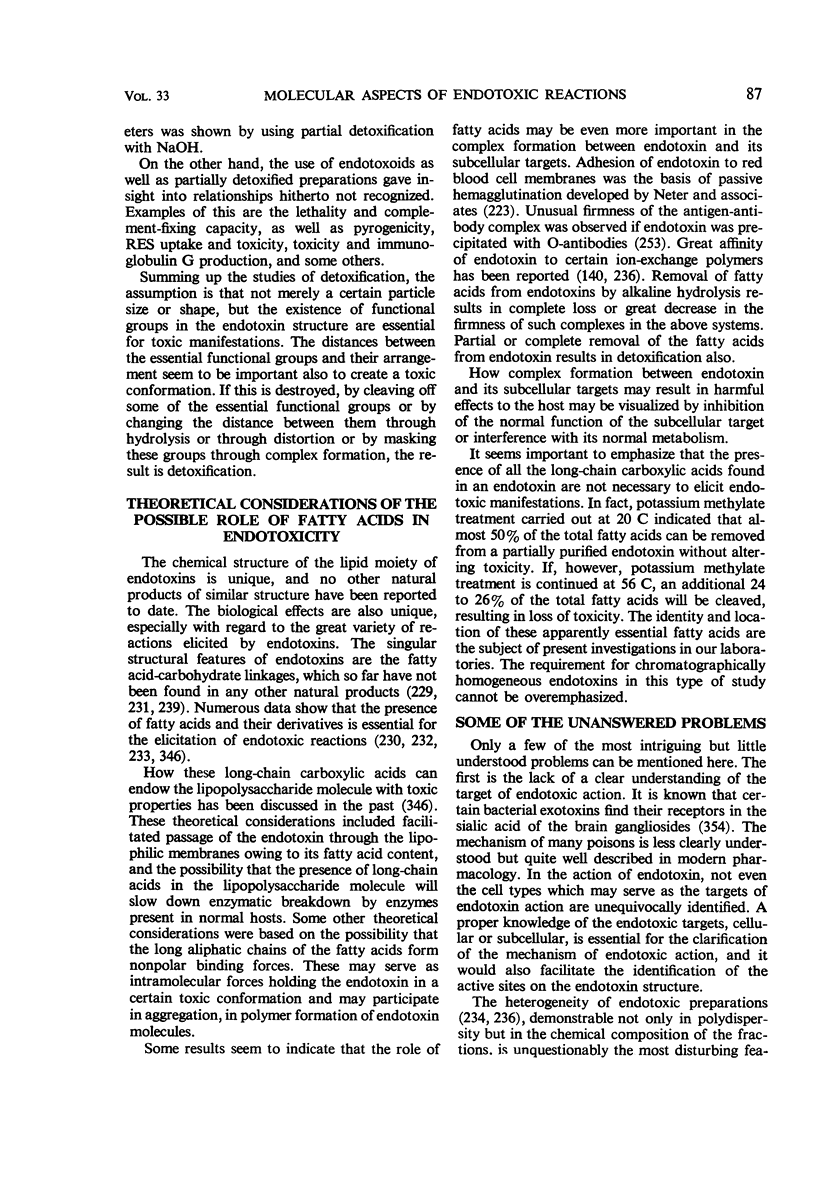
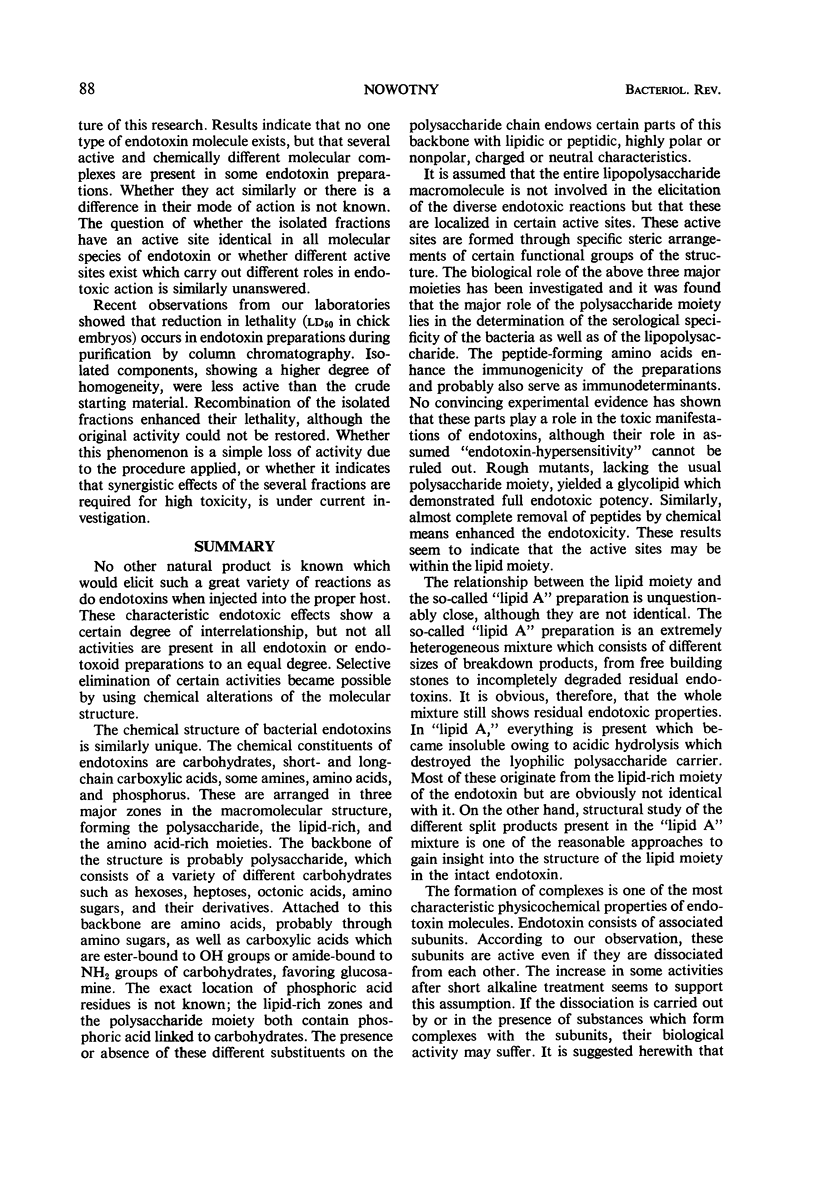
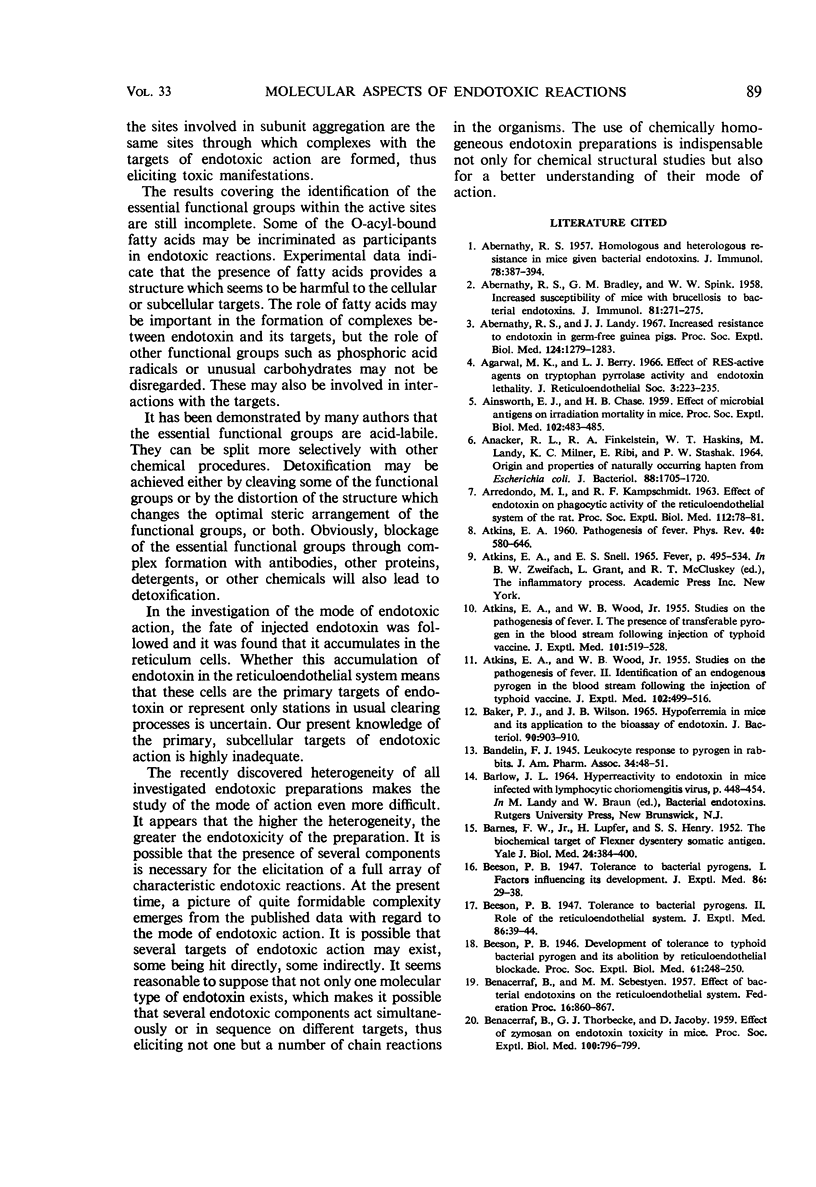
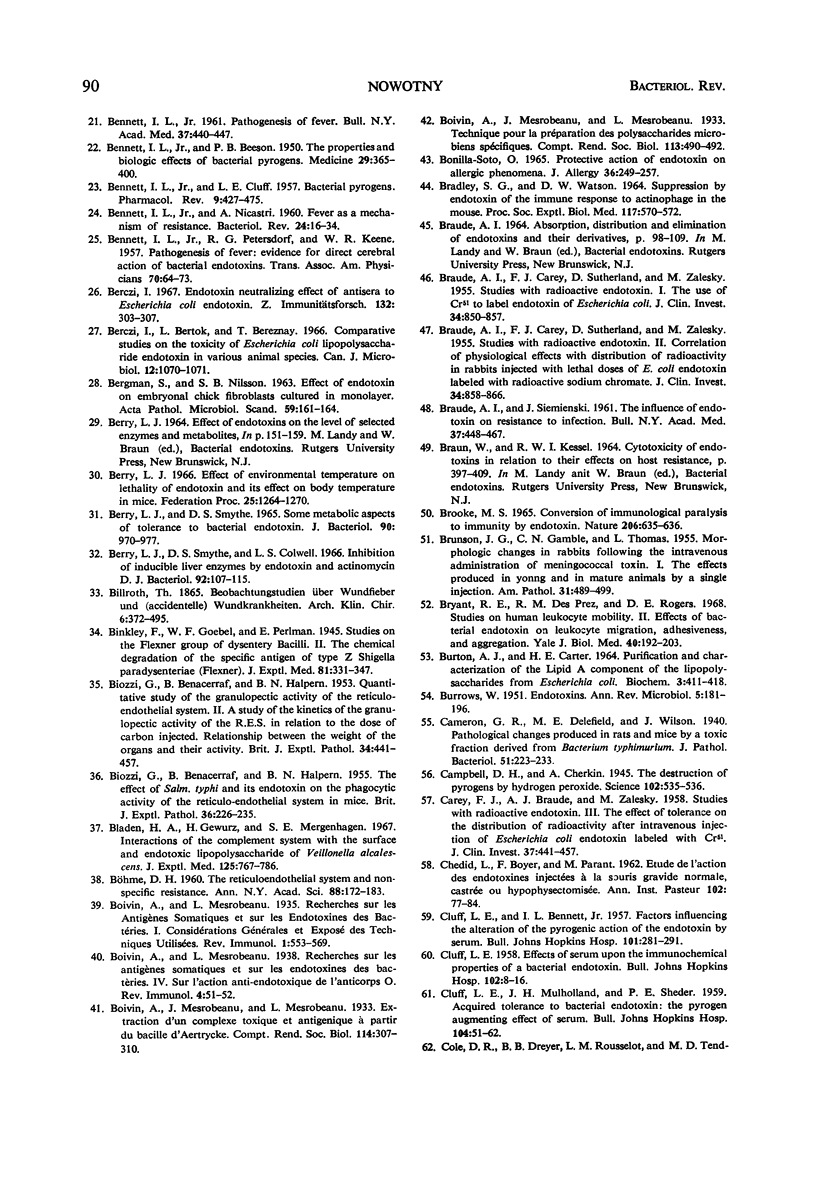
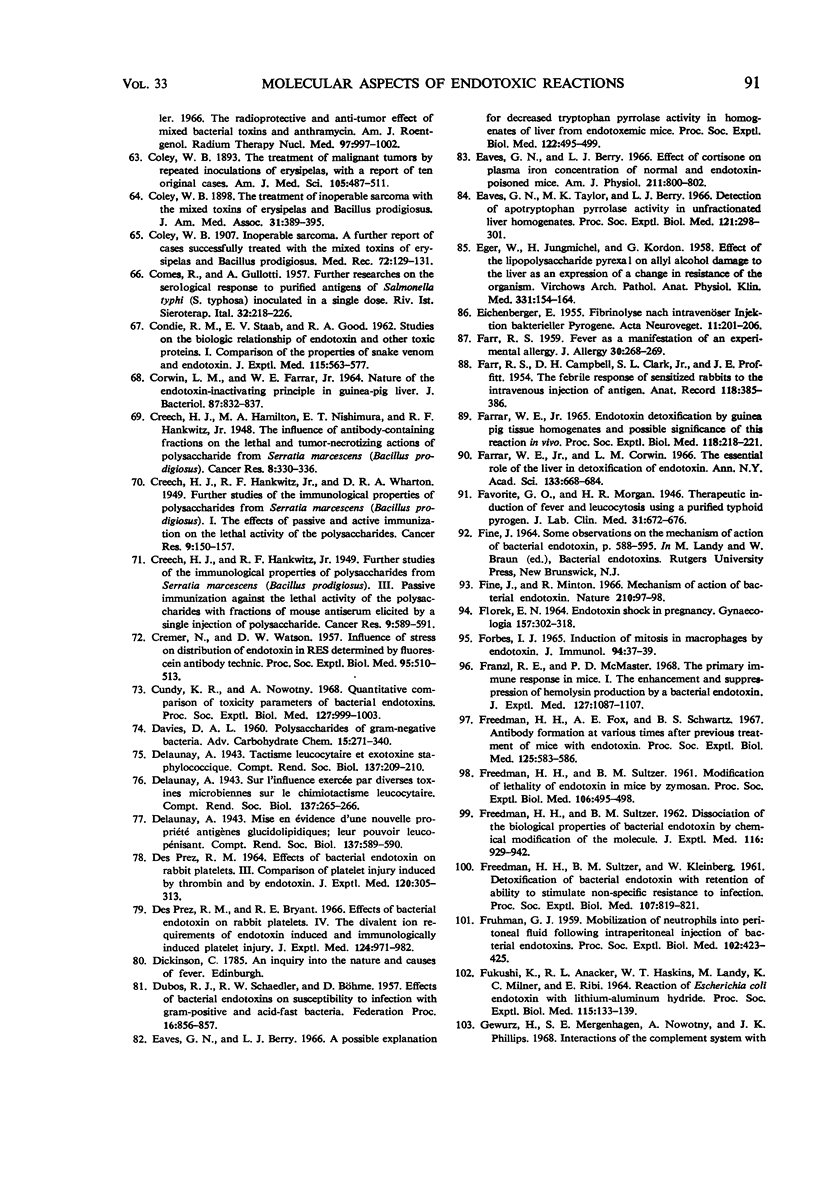
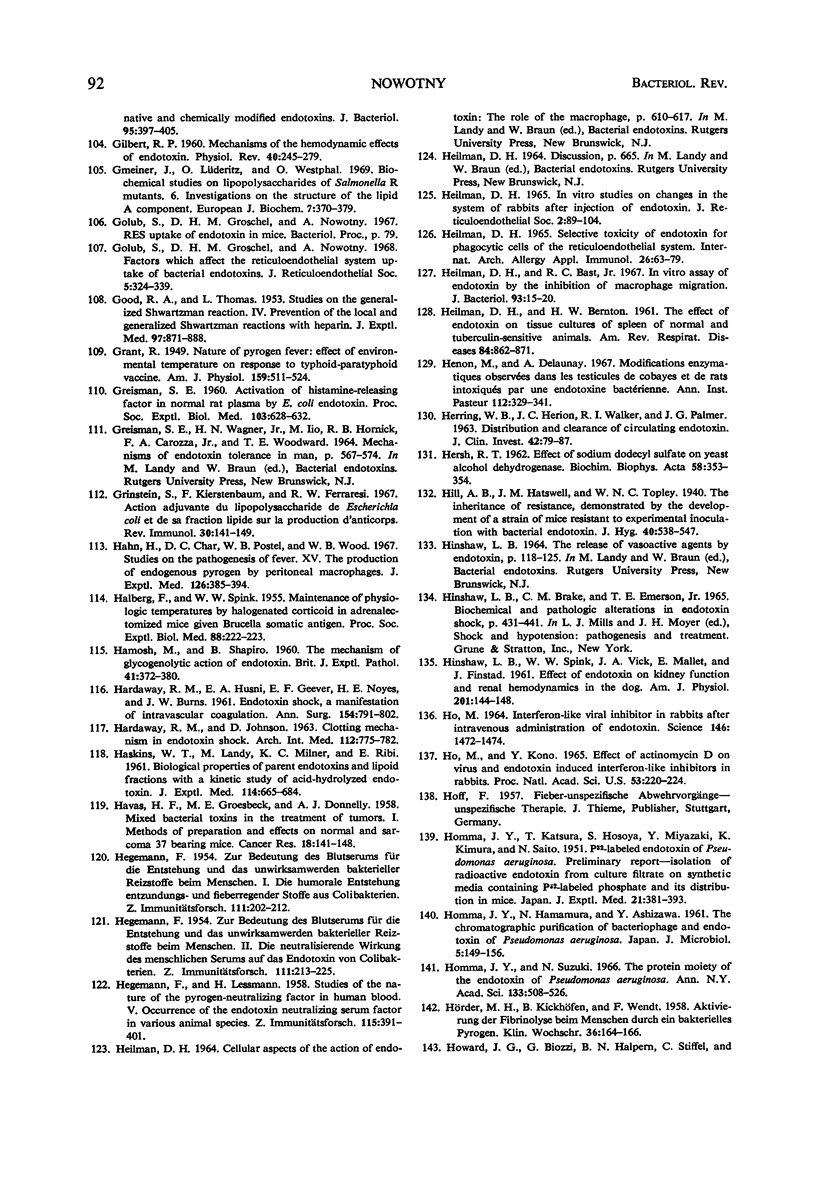
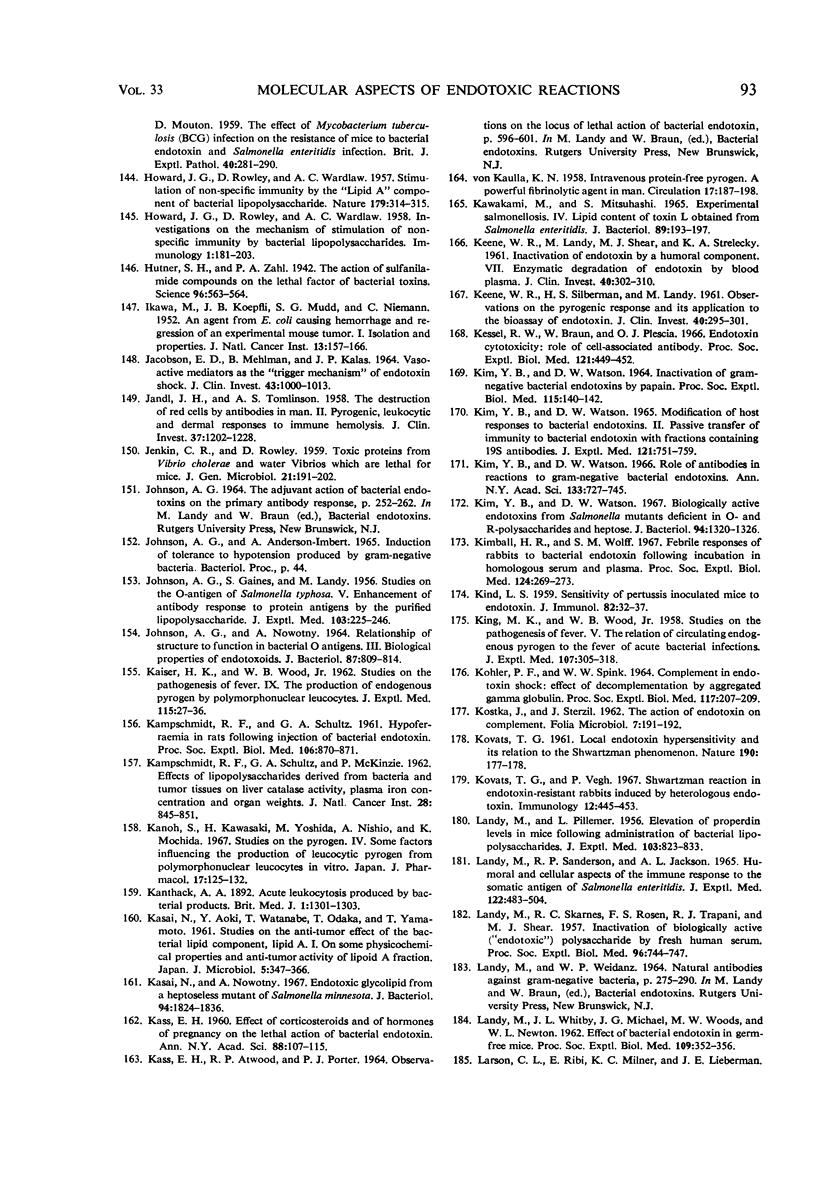
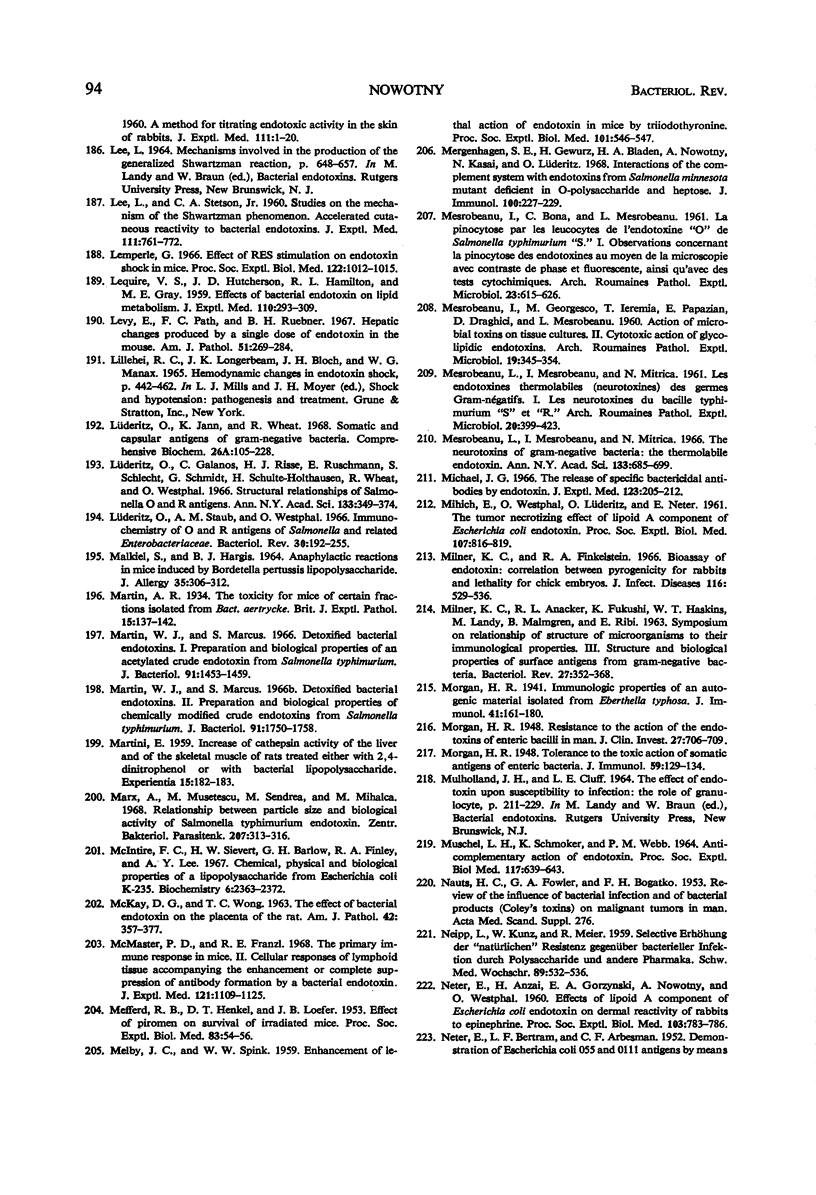
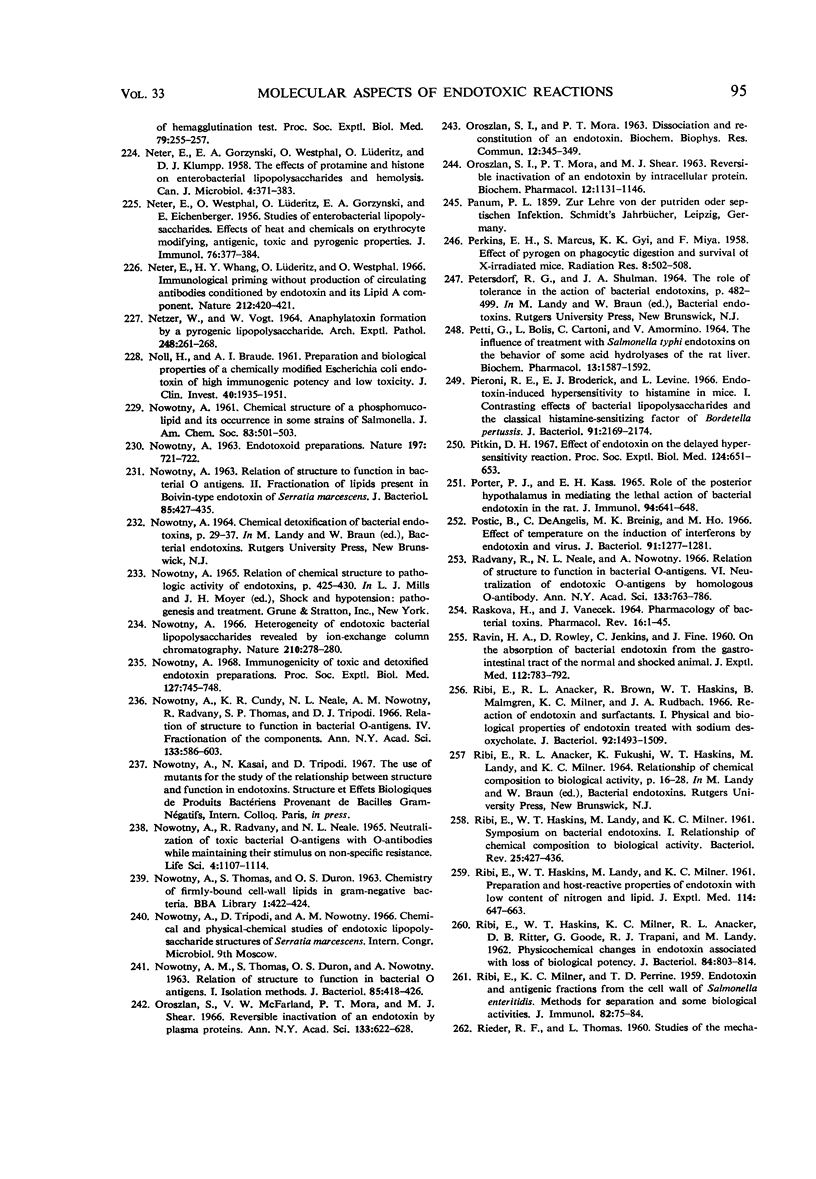
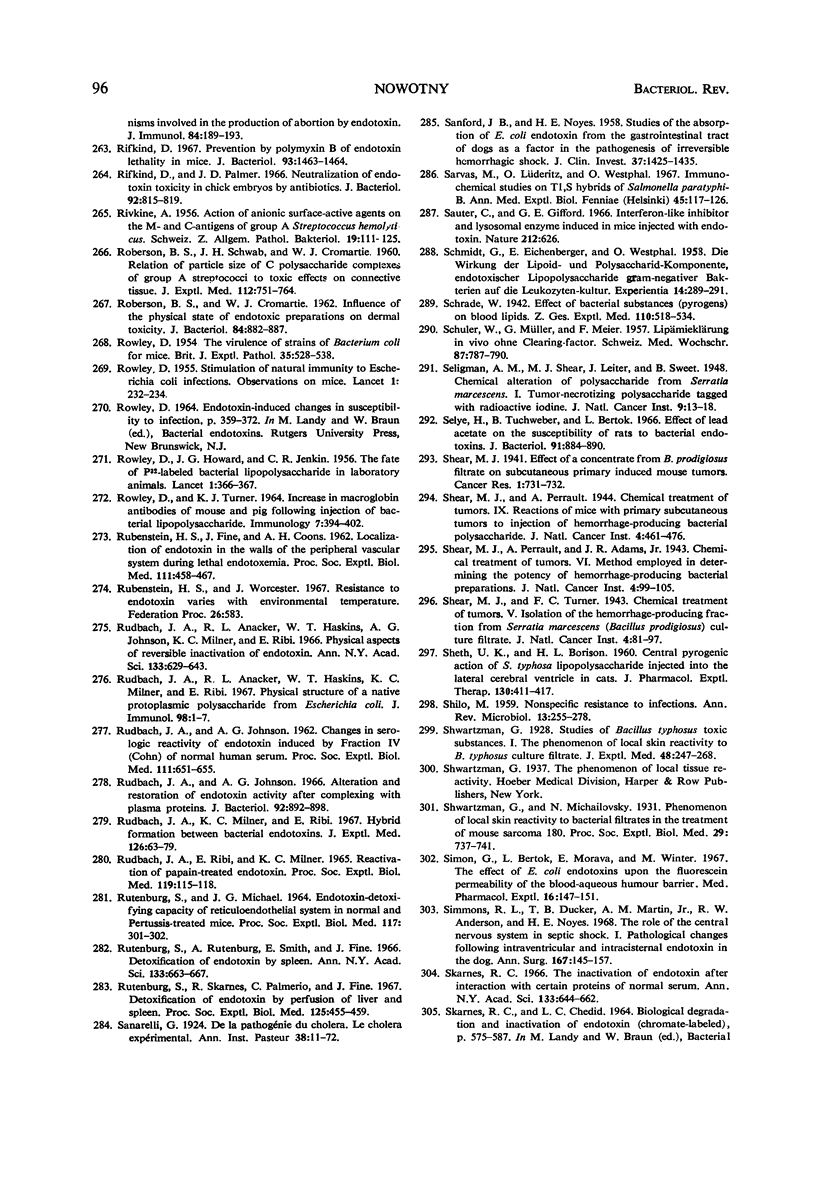
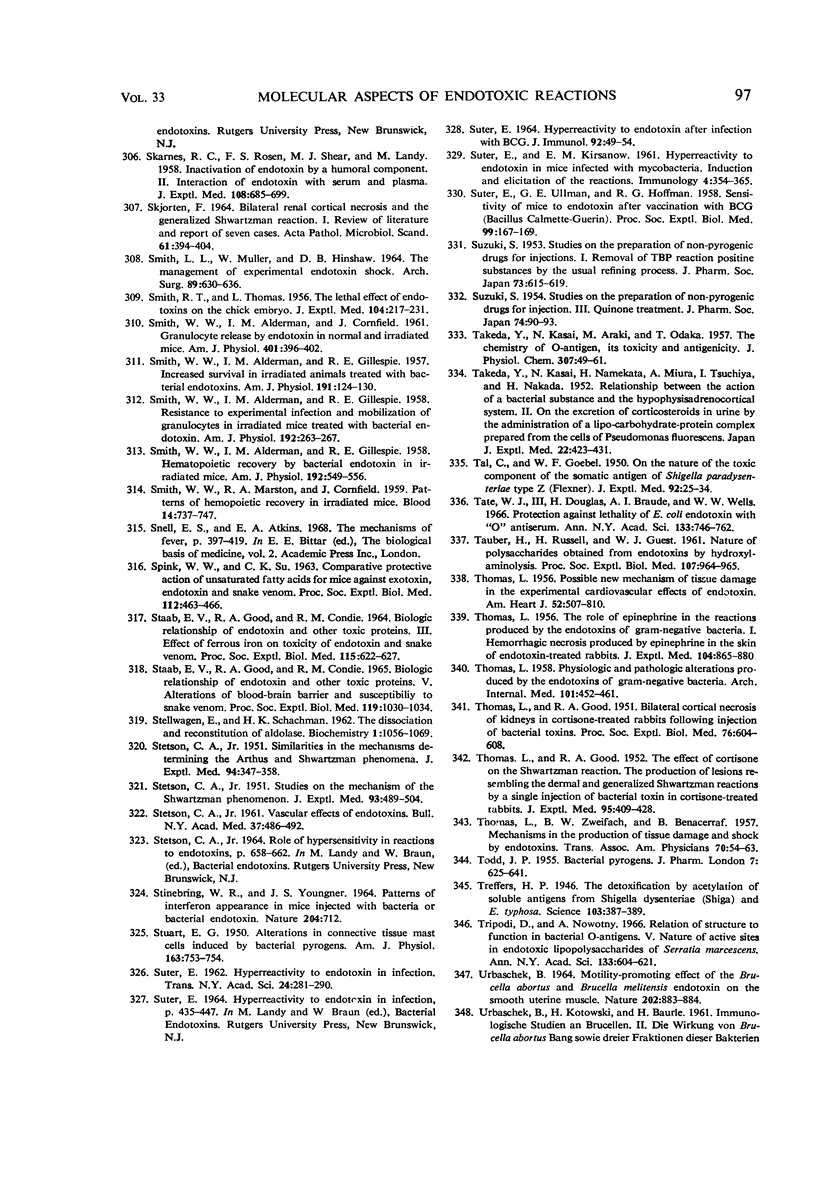
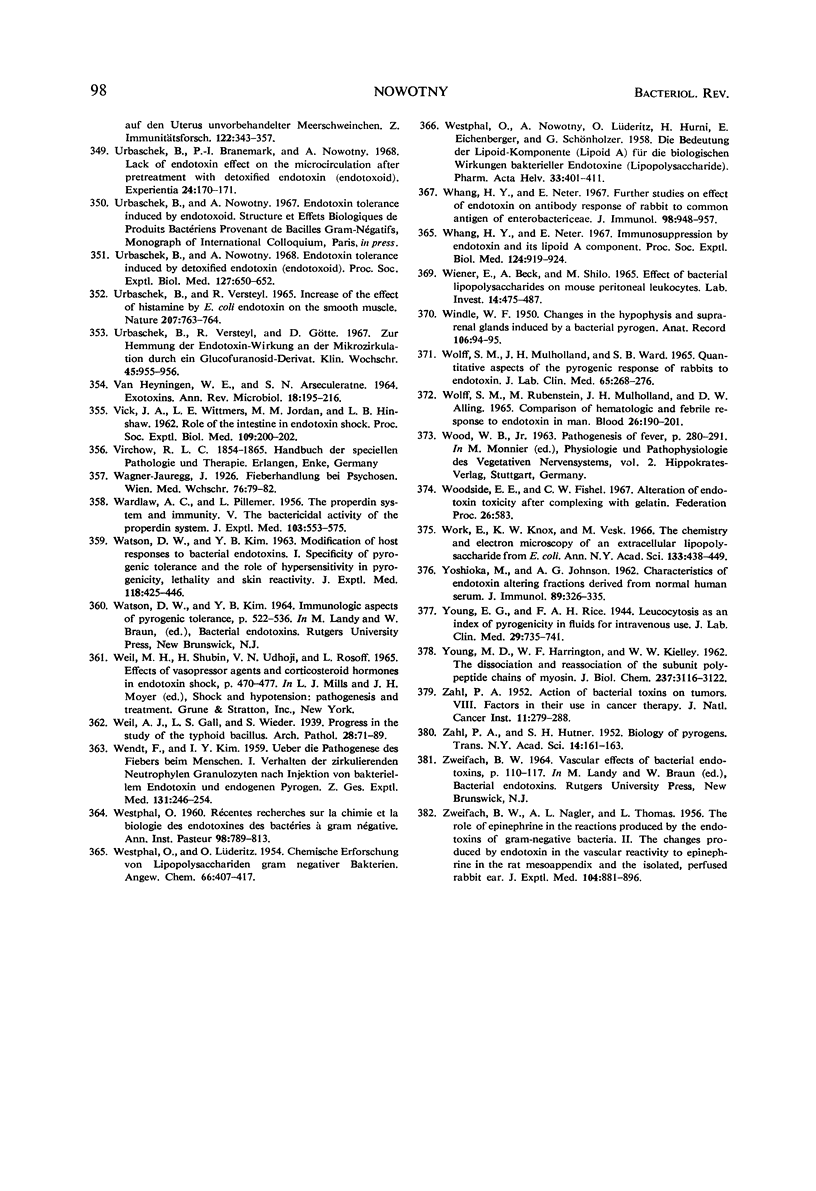
Selected References
These references are in PubMed. This may not be the complete list of references from this article.
- ABERNATHY R. S., BRADLEY G. M., SPINK W. W. Increased susceptibility of mice with brucellosis to bacterial endotoxins. J Immunol. 1958 Oct;81(4):271–275. [PubMed] [Google Scholar]
- ABERNATHY R. S. Homologous and heterologous resistance in mice given bacterial endotoxins. J Immunol. 1957 May;78(5):387–394. [PubMed] [Google Scholar]
- AINSWORTH E. J., CHASE H. B. Effect of microbial antigens on irradiation mortality in mice. Proc Soc Exp Biol Med. 1959 Nov;102:483–485. doi: 10.3181/00379727-102-25290. [DOI] [PubMed] [Google Scholar]
- ANACKER R. L., FINKELSTEIN R. A., HASKINS W. T., LANDY M., MILNER K. C., RIBI E., STASHAK P. W. ORIGIN AND PROPERTIES OF NATURALLY OCCURRING HAPTEN FROM ESCHERICHIA COLI. J Bacteriol. 1964 Dec;88:1705–1720. doi: 10.1128/jb.88.6.1705-1720.1964. [DOI] [PMC free article] [PubMed] [Google Scholar]
- ATKINS E. Pathogenesis of fever. Physiol Rev. 1960 Jul;40:580–646. doi: 10.1152/physrev.1960.40.3.580. [DOI] [PubMed] [Google Scholar]
- ATKINS E., WOOD W. B., Jr Studies on the pathogenesis of fever. I. The presence of transferable pyrogen in the blood stream following the injection of typhoid vaccine. J Exp Med. 1955 May 1;101(5):519–528. doi: 10.1084/jem.101.5.519. [DOI] [PMC free article] [PubMed] [Google Scholar]
- ATKINS E., WOOD W. B., Jr Studies on the pathogenesis of fever. II. Identification of an endogenous pyrogen in the blood stream following the injection of typhoid vaccine. J Exp Med. 1955 Nov 1;102(5):499–516. doi: 10.1084/jem.102.5.499. [DOI] [PMC free article] [PubMed] [Google Scholar]
- Abernathy R. S., Landy J. J. Increased resistance to endotoxin in germ-free guinea pigs. Proc Soc Exp Biol Med. 1967 Apr;124(4):1279–1283. doi: 10.3181/00379727-124-31988. [DOI] [PubMed] [Google Scholar]
- Agarwal M. K., Berry L. J. Effect of RES-active agents on tryptophan pyrrolase activity and endotoxin lethality. J Reticuloendothel Soc. 1966 Sep;3(3):223–235. [PubMed] [Google Scholar]
- BARNES F. W., Jr, LUPFER H., HENRY S. S. The biochemical target of Flexner dysentery somatic antigen; studies on the rat using antigen labeled with I131. Yale J Biol Med. 1952 Apr;24(5):384–400. [PMC free article] [PubMed] [Google Scholar]
- BENACERRAF B., SEBESTYEN M. M. Effect of bacterial endotoxins on the reticuloendothelial system. Fed Proc. 1957 Sep;16(3):860–867. [PubMed] [Google Scholar]
- BENACERRAF B., THORBECKE G. J., JACOBY D. Effect of zymosan on endotoxin toxicity in mice. Proc Soc Exp Biol Med. 1959 Apr;100(4):796–799. doi: 10.3181/00379727-100-24781. [DOI] [PubMed] [Google Scholar]
- BENNETT I. L., Jr, BEESON P. B. The properties and biologic effects of bacterial pyrogens. Medicine (Baltimore) 1950 Dec;29(4):365–400. doi: 10.1097/00005792-195012000-00003. [DOI] [PubMed] [Google Scholar]
- BENNETT I. L., Jr, CLUFF L. E. Bacterial pyrogens. Pharmacol Rev. 1957 Dec;9(4):427–479. [PubMed] [Google Scholar]
- BENNETT I. L., Jr, NICASTRI A. Fever as a mechanism of resistance. Bacteriol Rev. 1960 Mar;24(1):16–34. doi: 10.1128/br.24.1.16-34.1960. [DOI] [PMC free article] [PubMed] [Google Scholar]
- BENNETT I. L., Jr, PETERSDORF R. G., KEENE W. R. Pathogenesis of fever: evidence for direct cerebral action of bacterial endotoxins. Trans Assoc Am Physicians. 1957;70:64–73. [PubMed] [Google Scholar]
- BERGMAN S., NILSSON S. B. EFFECT OF ENDOTOXIN ON EMBRYONAL CHICK FIBROBLASTS CULTURED IN MONOLAYER. Acta Pathol Microbiol Scand. 1963;59:161–164. doi: 10.1111/j.1699-0463.1963.tb01782.x. [DOI] [PubMed] [Google Scholar]
- BIOZZI G., BENACERRAF B., HALPERN B. N. Quantitative study of the granulopectic activity of the reticulo-endothelial system. II. A study of the kinetics of the R. E. S. in relation to the dose of carbon injected; relationship between the weight of the organs and their activity. Br J Exp Pathol. 1953 Aug;34(4):441–457. [PMC free article] [PubMed] [Google Scholar]
- BIOZZI G., BENACERRAF B., HALPERN B. N. The effect of Salm. typhi and its endotoxin on the phagocytic activity of the reticuloendothelial system in mice. Br J Exp Pathol. 1955 Jun;36(3):226–235. [PMC free article] [PubMed] [Google Scholar]
- BONILLA-SOTO O. PROTECTIVE ACTION OF ENDOTOXIN ON ALLERGIC PHENOMENA. J Allergy. 1965 May-Jun;36:249–257. doi: 10.1016/0021-8707(65)90083-3. [DOI] [PubMed] [Google Scholar]
- BRADLEY S. G., WATSON D. W. SUPPRESSION BY ENDOTOXIN OF THE IMMUNE RESPONSE TO ACTINOPHAGE IN THE MOUSE. Proc Soc Exp Biol Med. 1964 Nov;117:570–572. doi: 10.3181/00379727-117-29640. [DOI] [PubMed] [Google Scholar]
- BRAUDE A. I., CAREY F. J., SUTHERLAND D., ZALESKY M. Studies with radioactive endotoxin. I. The use of Cr51 to label endotoxin of Escherichia coli. J Clin Invest. 1955 Jun;34(6):850–857. doi: 10.1172/JCI103140. [DOI] [PMC free article] [PubMed] [Google Scholar]
- BRAUDE A. I., CAREY F. J., ZALESKY M. Studies with radioactive endotoxin. II. Correlation of physiologic effects with distribution of radioactivity in rabbits injected with radioactive sodium chromate. J Clin Invest. 1955 Jun;34(6):858–866. doi: 10.1172/JCI103141. [DOI] [PMC free article] [PubMed] [Google Scholar]
- BRUNSON J. G., GAMBLE C. N., THOMAS L. Morphologic changes in rabbits following the intravenous administration of meningococcal toxin. I. The effects produced in young and in mature animals by a single injection. Am J Pathol. 1955 May-Jun;31(3):489–499. [PMC free article] [PubMed] [Google Scholar]
- BURROWS W. Endotoxins. Annu Rev Microbiol. 1951;5:181–196. doi: 10.1146/annurev.mi.05.100151.001145. [DOI] [PubMed] [Google Scholar]
- BURTON A. J., CARTER H. E. PURIFICATION AND CHARACTERIZATION OF THE LIPID A COMPONENT OF THE LIPOPOLYSACCHARIDES FROM ESCHERICHIA COLI. Biochemistry. 1964 Mar;3:411–418. doi: 10.1021/bi00891a018. [DOI] [PubMed] [Google Scholar]
- Baker P. J., Wilson J. B. Hypoferremia in mice and its application to the bioassay of endotoxin. J Bacteriol. 1965 Oct;90(4):903–910. doi: 10.1128/jb.90.4.903-910.1965. [DOI] [PMC free article] [PubMed] [Google Scholar]
- Berczi I., Bertók L., Bereznai T. Comparative studies on the toxicity of Escherichia coli lipopolysaccharide endotoxin in various animal species. Can J Microbiol. 1966 Oct;12(5):1070–1071. doi: 10.1139/m66-143. [DOI] [PubMed] [Google Scholar]
- Berczi I. Endotoxin neutralizing effect of antisera to Escherichia coli endotoxin. Z Immunitatsforsch Allerg Klin Immunol. 1967 Apr;132(4):303–307. [PubMed] [Google Scholar]
- Berry L. J. Effect of environmental temperature on lethality of endotoxin and its effect on body temperature in mice. Fed Proc. 1966 Jul-Aug;25(4):1264–1270. [PubMed] [Google Scholar]
- Berry L. J., Smythe D. S., Colwell L. S. Inhibition of inducible liver enzymes by endotoxin and actinomycin D. J Bacteriol. 1966 Jul;92(1):107–115. doi: 10.1128/jb.92.1.107-115.1966. [DOI] [PMC free article] [PubMed] [Google Scholar]
- Berry L. J., Smythe D. S. Some metabolic aspects of tolerance to bacterial endotoxin. J Bacteriol. 1965 Oct;90(4):970–977. doi: 10.1128/jb.90.4.970-977.1965. [DOI] [PMC free article] [PubMed] [Google Scholar]
- Bladen H. A., Gewurz H., Mergenhagen S. E. Interactions of the complement system with the surface and endotoxic lipopolysaccharide of Veillonella alcalescens. J Exp Med. 1967 May 1;125(5):767–786. doi: 10.1084/jem.125.5.767. [DOI] [PMC free article] [PubMed] [Google Scholar]
- Brooke M. S. Conversion of immunological paralysis to immunity by endotoxin. Nature. 1965 May 8;206(984):635–636. doi: 10.1038/206635a0. [DOI] [PubMed] [Google Scholar]
- Bryant R. E., Des Prez R. M., Rogers D. E. Studies on human leukocyte motility. II. Effects of bacterial endotoxin on leukocyte migration, adhesiveness, and aggregation. Yale J Biol Med. 1967 Dec;40(3):192–204. [PMC free article] [PubMed] [Google Scholar]
- CAREY F. J., BRAUDE A. I., ZALESKY M. Studies with radioactive endotoxin. III. The effect of tolerance on the distribution of radioactivity after intravenous injection of Escherichia coli endotoxin labeled with Cr51. J Clin Invest. 1958 Mar;37(3):441–457. doi: 10.1172/JCI103624. [DOI] [PMC free article] [PubMed] [Google Scholar]
- CHEDID L., BOYER F., PARANT M. [Study of the abortive action of endotoxins injected into the normal, castrated or hypophysectomized pregnant female mouse]. Ann Inst Pasteur (Paris) 1962 Jan;102:77–84. [PubMed] [Google Scholar]
- CLUFF L. E., BENNETT I. L., Jr Factors influencing the alteration of the pyrogenic action of endotoxin by serum. Bull Johns Hopkins Hosp. 1957 Nov;101(5):281–291. [PubMed] [Google Scholar]
- CLUFF L. E. Effects of serum upon the immuno-chemical properties of a bacterial endotoxin. Bull Johns Hopkins Hosp. 1958 Jan;102(1):8–16. [PubMed] [Google Scholar]
- CLUFF L. E., MULHOLLAND J. H., SCHEDER E. P. Acquired tolerance to bacterial endotoxin: the pyrogen augmenting effect of serum. Bull Johns Hopkins Hosp. 1959 Feb;104(2):51–62. [PubMed] [Google Scholar]
- CONDIE R. M., STAAB E. V., GOOD R. A. Studies on the biologic relationship of endotoxin and other toxic proteins. I. Comparison of the properties of snake venom and endotoxin. J Exp Med. 1962 Mar 1;115:563–578. doi: 10.1084/jem.115.3.563. [DOI] [PMC free article] [PubMed] [Google Scholar]
- CORWIN L. M., FARRAR W. E., Jr NATURE OF THE ENDOTOXIN-INACTIVATING PRINCIPLE IN GUINEA-PIG LIVER. J Bacteriol. 1964 Apr;87:832–837. doi: 10.1128/jb.87.4.832-837.1964. [DOI] [PMC free article] [PubMed] [Google Scholar]
- CREMER N., WATSON D. W. Influence of stress on distribution of endotoxin in RES determined by fluorescein antibody technic. Proc Soc Exp Biol Med. 1957 Jul;95(3):510–513. doi: 10.3181/00379727-95-23271. [DOI] [PubMed] [Google Scholar]
- Campbell D. H., Cherkin A. THE DESTRUCTION OF PYROGENS BY HYDROGEN PEROXIDE. Science. 1945 Nov 23;102(2656):535–536. doi: 10.1126/science.102.2656.535. [DOI] [PubMed] [Google Scholar]
- Cundy K. R., Nowotny A. Comparisons of 5 toxicity parameters of Serratia marcescens endotoxins. Proc Soc Exp Biol Med. 1968 Apr;127(4):999–1003. doi: 10.3181/00379727-127-32854. [DOI] [PubMed] [Google Scholar]
- DAVIES D. A. Polysaccharides of gram-negative bacteria. Adv Carbohydr Chem. 1960;15:271–340. doi: 10.1016/s0096-5332(08)60190-3. [DOI] [PubMed] [Google Scholar]
- DUBOS R. J., SCHAEDLER R. W., BOHME D. Effects of bacterial endotoxins on susceptibility to infection with gram-positive and acid-fast bacteria. Fed Proc. 1957 Sep;16(3):856–857. [PubMed] [Google Scholar]
- Des Prez R. M., Bryant R. E. Effects of bacterial endotoxin on rabbit platelets. IV. The divalent ion requirements of endotoxin-induced and immunologically induced platelet injury. J Exp Med. 1966 Nov 1;124(5):971–982. doi: 10.1084/jem.124.5.971. [DOI] [PMC free article] [PubMed] [Google Scholar]
- EGER W., JUNGMICHEL H., KORDON G. Untersuchungen über den Einfluss des Lipopolysaccharid Pyrexal auf die Allylalkoholschädigung der Leber als Ausdruck einer Resistenzänderung des Organismus. Virchows Arch Pathol Anat Physiol Klin Med. 1958;331(2):154–164. doi: 10.1007/BF00955193. [DOI] [PubMed] [Google Scholar]
- EICHENBERGER E. Fibrinolyse nach intravenöser Injektion bakterieller Pyrogene. Acta Neuroveg (Wien) 1955;11(1-4):201–206. doi: 10.1007/BF01241228. [DOI] [PubMed] [Google Scholar]
- Eaves G. N., Berry L. J. A possible explanation for decreased tryptophan pyrrolase activity in homogenates of liver from endotoxemic mice. Proc Soc Exp Biol Med. 1966 Jun;122(2):495–499. doi: 10.3181/00379727-122-31171. [DOI] [PubMed] [Google Scholar]
- Eaves G. N., Berry L. J. Effect of cortisone on plasma iron concentration of normal and endotoxin-poisoned mice. Am J Physiol. 1966 Sep;211(3):800–802. doi: 10.1152/ajplegacy.1966.211.3.800. [DOI] [PubMed] [Google Scholar]
- Eaves G. N., Taylor M. K., Berry L. J. Detection of apotryptophan pyrrolase activity in unfractionated liver homogenates. Proc Soc Exp Biol Med. 1966 Jan;121(1):298–301. doi: 10.3181/00379727-121-30763. [DOI] [PubMed] [Google Scholar]
- FARRAR W. E., Jr ENDOTOXIN DETOXIFICATION BY GUINEA PIG TISSUE HOMOGENATES AND POSSIBLE SIGNIFICANCE OF THIS REACTION IN VIVO. Proc Soc Exp Biol Med. 1965 Jan;118:218–221. doi: 10.3181/00379727-118-29802. [DOI] [PubMed] [Google Scholar]
- FLOREK E. N. ENDOTOXIN SHOCK IN PREGNANCY. (REVIEW OF THE LITERATURE). Gynaecologia. 1964;157:302–318. [PubMed] [Google Scholar]
- FORBES I. J. INDUCTION OF MITOSIS IN MACROPHAGES BY ENDOTOXIN. J Immunol. 1965 Jan;94:37–39. [PubMed] [Google Scholar]
- FREEDMAN H. H., SULTZER B. M. Dissociation of the biological properties of bacterial endotoxin by chemical modification of the molecule. J Exp Med. 1962 Dec 1;116:929–942. doi: 10.1084/jem.116.6.929. [DOI] [PMC free article] [PubMed] [Google Scholar]
- FREEDMAN H. H., SULTZER B. M. Modification of lethality of endotoxin in mice by zymosan. Proc Soc Exp Biol Med. 1961 Mar;106:495–498. doi: 10.3181/00379727-106-26381. [DOI] [PubMed] [Google Scholar]
- FRUHMAN G. J. Mobilization of neutrophils into peritoneal fluid following intraperitoneal injection of bacterial endotoxins. Proc Soc Exp Biol Med. 1959 Nov;102:423–425. doi: 10.3181/00379727-102-25272. [DOI] [PubMed] [Google Scholar]
- FUKUSHI K., ANACKER R. L., HASKINS W. T., LANDY M., MILNER K. C., RIBI E. REACTION OF ESCHERICHIA COLI ENDOTOXIN WITH LITHIUM ALUMINUM HYDRIDE. Proc Soc Exp Biol Med. 1964 Jan;115:133–139. doi: 10.3181/00379727-115-28851. [DOI] [PubMed] [Google Scholar]
- Farrar W. E., Jr, Corwin L. M. The essential role of the liver in detoxification of endotoxin. Ann N Y Acad Sci. 1966 Jun 30;133(2):668–684. doi: 10.1111/j.1749-6632.1966.tb52397.x. [DOI] [PubMed] [Google Scholar]
- Fine J., Minton R. Mechanism of action of bacterial endotoxin. Nature. 1966 Apr 2;210(5031):97–98. doi: 10.1038/210097a0. [DOI] [PubMed] [Google Scholar]
- Franzl R. E., McMaster P. D. The primary immune response in mice. I. The enhancement and suppression of hemolysin production by a bacterial endotoxin. J Exp Med. 1968 Jun 1;127(6):1087–1107. doi: 10.1084/jem.127.6.1087. [DOI] [PMC free article] [PubMed] [Google Scholar]
- Freedman H. H., Fox A. E., Schwartz B. S. Antibody formation at various times after previous treatment of mice with endotoxin. Proc Soc Exp Biol Med. 1967 Jun;125(2):583–587. doi: 10.3181/00379727-125-32152. [DOI] [PubMed] [Google Scholar]
- GILBERT R. P. Mechanisms of the hemodynamic effects of endotoxin. Physiol Rev. 1960 Apr;40:245–279. doi: 10.1152/physrev.1960.40.2.245. [DOI] [PubMed] [Google Scholar]
- GOOD R. A., THOMAS L. Studies on the generalized Shwartzman reaction. IV. Prevention of the local and generalized Shwartzman reactions with heparin. J Exp Med. 1953 Jun;97(6):871–888. doi: 10.1084/jem.97.6.871. [DOI] [PMC free article] [PubMed] [Google Scholar]
- GRANT R. Nature of pyrogen fever; effect of environmental temperature on response to typhoid-paratyphoid vaccine. Am J Physiol. 1949 Dec;159(3):511–524. doi: 10.1152/ajplegacy.1949.159.3.511. [DOI] [PubMed] [Google Scholar]
- GREISMAN S. E. Activation of histamine-releasing factor in normal rat plasma by E. coli endotoxin. Proc Soc Exp Biol Med. 1960 Mar;103:628–632. doi: 10.3181/00379727-103-25618. [DOI] [PubMed] [Google Scholar]
- Gewurz H., Mergenhagen S. E., Nowotny A., Phillips J. K. Interactions of the complement system with native and chemically modified endotoxins. J Bacteriol. 1968 Feb;95(2):397–405. doi: 10.1128/jb.95.2.397-405.1968. [DOI] [PMC free article] [PubMed] [Google Scholar]
- Gmeiner J., Lüderitz O., Westphal O. Biochemical studies on lipopolysaccharides of Salmonella R mutants. 6. Investigations on the structure of the lipid A component. Eur J Biochem. 1969 Jan;7(3):370–379. doi: 10.1111/j.1432-1033.1969.tb19618.x. [DOI] [PubMed] [Google Scholar]
- Golub S., Gröschel D., Nowotny A. Factors which affect the reticuloendothelial system uptake of bacterial endotoxins. J Reticuloendothel Soc. 1968 Aug;5(4):324–339. [PubMed] [Google Scholar]
- Grinstein S., Kierszenbaum F., Ferraresi R. W. Action adjuvante du lipopolysaccharide de Escherichia coli et de sa fraction lipide sur la production d'anticorps. Rev Immunol Ther Antimicrob. 1966 Apr-Jun;30(3):141–149. [PubMed] [Google Scholar]
- HALBERG F., SPINK W. W. Maintenance of physiologic temperatures by halogenated corticoid in adrenalectomized mice given Brucella somatic antigen. Proc Soc Exp Biol Med. 1955 Feb;88(2):222–223. doi: 10.3181/00379727-88-21544. [DOI] [PubMed] [Google Scholar]
- HAMOSH M., SHAPIRO B. The mechanism of glycogenolytic action of endotoxin. Br J Exp Pathol. 1960 Aug;41:372–380. [PMC free article] [PubMed] [Google Scholar]
- HARDAWAY R. M., HUSNI E. A., GEEVER E. F., NOYESHE, BURNS J. W. Endotoxin shock. A manifestation of intravascular coagulation. Ann Surg. 1961 Nov;154:791–802. doi: 10.1097/00000658-196111000-00003. [DOI] [PMC free article] [PubMed] [Google Scholar]
- HARDAWAY R. M., JOHNSON D. CLOTTING MECHANISM IN ENDOTOXIN SHOCK. Arch Intern Med. 1963 Nov;112:775–782. doi: 10.1001/archinte.1963.03860050162020. [DOI] [PubMed] [Google Scholar]
- HASKINS W. T., LANDY M., MILNER K. C., RIBI E. Biological properties of parent endotoxins and lipoid fractions, with a kinetic study of acid-hydrolyzed endotoxin. J Exp Med. 1961 Nov 1;114:665–684. doi: 10.1084/jem.114.5.665. [DOI] [PMC free article] [PubMed] [Google Scholar]
- HAVAS H. F., GROESBECK M. E., DONNELLY A. J. Mixed bacterial toxins in the treatment of tumors. I. Methods of preparation and effects on normal and sarcoma 37-bearing mice. Cancer Res. 1958 Feb;18(2):141–148. [PubMed] [Google Scholar]
- HEGEMANN F., LESSMANN H. Studien Uber die Natur des fieberstoffneutralisierenden Faktors in normalen menschlichen Blut. V. Uber das Vorkommen des endotoxinneutralisierenden Serumfaktors bei verschiedenen Tierarten. Z Immun exp ther. 1958 May;115(5):391–401. [PubMed] [Google Scholar]
- HEGEMANN F. Zur Bedeutung des Blutserums für die Entstehung und das Unwirksamwerden bakterieller Reizstoffe beim Menschen. I. Die humorale Entstehung entzündungs- und fiebererregender Stoffe aus Colibakterien. Z Immun exp ther. 1954 Aug;111(3):202–212. [PubMed] [Google Scholar]
- HEGEMANN F. Zur Bedeutung des Blutserums für die Entstehung und das Unwirksamwerden bakterieller Reizstoffe beim Menschen. II. Die neutralisierende Wirkung des menschlichen Serums auf das Endotoxin von Colibakterien. Z Immun exp ther. 1954 Aug;111(3):213–225. [PubMed] [Google Scholar]
- HEILMAN D. H., BERNTON H. W. The effect of endotoxin on tissue cultures of spleen of normal and tuberculin-sensitive animals. Am Rev Respir Dis. 1961 Dec;84:862–871. doi: 10.1164/arrd.1961.84.6.862. [DOI] [PubMed] [Google Scholar]
- HEILMAN D. H. THE SELECTIVE TOXICITY OF ENDOTOXIN FOR PHAGOCYTIC CELLS OF THE RETICULOENDOTHELIAL SYSTEM. Int Arch Allergy Appl Immunol. 1965;26:63–79. doi: 10.1159/000229555. [DOI] [PubMed] [Google Scholar]
- HERRING W. B., HERION J. C., WALKER R. I., PALMER J. G. Distribution and clearance of circulating endotoxin. J Clin Invest. 1963 Jan;42:79–87. doi: 10.1172/JCI104698. [DOI] [PMC free article] [PubMed] [Google Scholar]
- HERSH R. T. Effect of sodium dodecyl sulfate on yeast alcohol dehydrogenase. Biochim Biophys Acta. 1962 Apr 9;58:353–354. doi: 10.1016/0006-3002(62)91021-1. [DOI] [PubMed] [Google Scholar]
- HINSHAW L. B., SPINK W. W., VICK J. A., MALLET E., FINSTAD J. Effect of endotoxin on kidney function and renal hemodynamics in the dog. Am J Physiol. 1961 Jul;201:144–148. doi: 10.1152/ajplegacy.1961.201.1.144. [DOI] [PubMed] [Google Scholar]
- HO M. INTERFERON-LIKE VIRAL INHIBITOR IN RABBITS AFTER INTRAVENOUS ADMINISTRATION OF ENDOTOXIN. Science. 1964 Dec 11;146(3650):1472–1474. doi: 10.1126/science.146.3650.1472. [DOI] [PubMed] [Google Scholar]
- HO M., KONO Y. EFFECT OF ACTINOMYCIN D ON VIRUS AND ENDOTOXIN-INDUCED INTERFERONLIKE INHIBITORS IN RABBITS. Proc Natl Acad Sci U S A. 1965 Jan;53:220–224. doi: 10.1073/pnas.53.1.220. [DOI] [PMC free article] [PubMed] [Google Scholar]
- HOMMA J. Y., HAMAMURA N., ASHIZAWA Y. The chromato-Pseudomonas aeruginosa. Jpn J Microbiol. 1961 Apr;5:149–156. doi: 10.1111/j.1348-0421.1961.tb00195.x. [DOI] [PubMed] [Google Scholar]
- HORDER M. H., KICKHOFEN B., WENDT F. Aktivierung der Fibrinolyse beim Menschen durch ein bakterielles Pyrogen; der Einfluss von Phenylbutazon und Heparin auf Fibrinolyse, Blutgerinnung und Fieberreaktion. Klin Wochenschr. 1958 Feb 15;36(4):164–166. doi: 10.1007/BF01481612. [DOI] [PubMed] [Google Scholar]
- HOWARD J. G., BIOZZI G., HALPERN B. N., STIFFEL C., MOUTON D. The effect of Mycobacterium tuberculosis (BCG) infection on the resistance of mice to bacterial endotoxin and Salmonella enteritidis infection. Br J Exp Pathol. 1959 Jun;40(3):281–290. [PMC free article] [PubMed] [Google Scholar]
- HOWARD J. G., ROWLEY D., WARDLAW A. C. Investigations on the mechanism of stimulation of non-specific immunity by bacterial lipopolysaccharides. Immunology. 1958 Jul;1(3):181–203. [PMC free article] [PubMed] [Google Scholar]
- HOWARD J. G., ROWLEY D., WARDLAW A. C. Stimulation of non-specific immunity by the lipid A component of bacterial lipopolysaccharide. Nature. 1957 Feb 9;179(4554):314–315. doi: 10.1038/179314a0. [DOI] [PubMed] [Google Scholar]
- Hahn H. H., Char D. C., Postel W. B., Wood W. B., Jr Studies on the pathogenesis of fever. XV. The production of endogenous pyrogen by peritoneal macrophages. J Exp Med. 1967 Aug 1;126(2):385–394. doi: 10.1084/jem.126.2.385. [DOI] [PMC free article] [PubMed] [Google Scholar]
- Heilman D. H., Bast R. C., Jr In vitro assay of endotoxin by the inhibition of macrophage migration. J Bacteriol. 1967 Jan;93(1):15–20. doi: 10.1128/jb.93.1.15-20.1967. [DOI] [PMC free article] [PubMed] [Google Scholar]
- Heilman D. H. In vitro studies on changes in the reticuloendothelial system of rabbits after an injection of endotoxin. J Reticuloendothel Soc. 1965 Jul;2(2):89–104. [PubMed] [Google Scholar]
- Homma J. Y., Suzuki N. The protein moiety of the endotoxin of Pseudomonas aeruginosa. Ann N Y Acad Sci. 1966 Jun 30;133(2):508–526. doi: 10.1111/j.1749-6632.1966.tb52386.x. [DOI] [PubMed] [Google Scholar]
- Hutner S. H., Zahl P. A. THE ACTION OF SULFANILAMIDE COMPOUNDS ON THE LETHAL FACTOR OF BACTERIAL TOXINS. Science. 1942 Dec 18;96(2503):563–564. doi: 10.1126/science.96.2503.563. [DOI] [PubMed] [Google Scholar]
- Hénon M., Delaunay A. Modifications enzymatiques observées dans les testicules de cobayes et de rats intoxiqués par une endotoxine bactérienne. Ann Inst Pasteur (Paris) 1967 Mar;112(3):329–341. [PubMed] [Google Scholar]
- IKAWA M., KOEPFLI J. B., MUDD S. G., NIEMANN C. An agent from E. coli causing hemorrhage and regression of an experimental mouse tumor. I. Isolation and properties. J Natl Cancer Inst. 1952 Aug;13(1):157–166. [PubMed] [Google Scholar]
- JACOBSON E. D., MEHLMAN B., KALAS J. P. VASOACTIVE MEDIATORS AS THE "TRIGGER MECHANISM" OF ENDOTOXIN SHOCK. J Clin Invest. 1964 May;43:1000–1013. doi: 10.1172/JCI104963. [DOI] [PMC free article] [PubMed] [Google Scholar]
- JANDL J. H., TOMLINSON A. S. The destruction of red cells by antibodies in man. II. Pyrogenic, leukocytic and dermal responses to immune hemolysis. J Clin Invest. 1958 Aug;37(8):1202–1228. doi: 10.1172/JCI103710. [DOI] [PMC free article] [PubMed] [Google Scholar]
- JENKIN C. R., ROWLEY D. Toxic proteins from Vibrio cholerae and water vibrios which are lethal for mice. J Gen Microbiol. 1959 Aug;21:191–202. doi: 10.1099/00221287-21-1-191. [DOI] [PubMed] [Google Scholar]
- JOHNSON A. G., GAINES S., LANDY M. Studies on the O antigen of Salmonella typhosa. V. Enhancement of antibody response to protein antigens by the purified lipopolysaccharide. J Exp Med. 1956 Feb 1;103(2):225–246. doi: 10.1084/jem.103.2.225. [DOI] [PMC free article] [PubMed] [Google Scholar]
- JOHNSON A. G., NOWOTNY A. RELATIONSHIP OF STRUCTURE TO FUNCTION IN BACTERIAL O ANTIGENS. III. BIOLOGICAL PROPERTIES OF ENDOTOXOIDS. J Bacteriol. 1964 Apr;87:809–814. doi: 10.1128/jb.87.4.809-814.1964. [DOI] [PMC free article] [PubMed] [Google Scholar]
- KAISER H. K., WOOD W. B., Jr Studies on the pathogensis of fever. IX. The production of endogenous pyrogen by polymorphonuclear leucocytes. J Exp Med. 1962 Jan 1;115:27–36. doi: 10.1084/jem.115.1.27. [DOI] [PMC free article] [PubMed] [Google Scholar]
- KAMPSCHMIDT R. F., SCHULTZ G. A. Hypoferremia in rats following injection of bacterial endotoxin. Proc Soc Exp Biol Med. 1961 Apr;106:870–871. doi: 10.3181/00379727-106-26504. [DOI] [PubMed] [Google Scholar]
- KAMPSCHMIDT R. F., SCHULTZ G., McKINZIE P. Effects of lipopolysaccharides derived from bacteria and tumor tissues on liver catalase activity, plasma iron concentration and organ weights. J Natl Cancer Inst. 1962 Apr;28:845–851. [PubMed] [Google Scholar]
- KAWAKAMI M., MITSUHASHI S. EXPERIMENTAL SALMONELLOSIS. IV. LIPID CONTENT OF TOXIN L OBTAINED FROM SALMONELLA ENTERITIDIS. J Bacteriol. 1965 Jan;89:193–197. doi: 10.1128/jb.89.1.193-197.1965. [DOI] [PMC free article] [PubMed] [Google Scholar]
- KEENE W. R., LANDY M., SHEAR M. J. Inactivation of endotoxin by a humoral component. VII. Enzymatic degradation of endotoxin by blood plasma. J Clin Invest. 1961 Feb;40:302–310. doi: 10.1172/JCI104257. [DOI] [PMC free article] [PubMed] [Google Scholar]
- KEENE W. R., SILBERMAN H. R., LANDY M. Observations on the pyrogenic response and its application to the bioassay of endotoxin. J Clin Invest. 1961 Feb;40:295–301. doi: 10.1172/JCI104256. [DOI] [PMC free article] [PubMed] [Google Scholar]
- KIM Y. B., WATSON D. W. INACTIVATION OF GRAM-NEGATIVE BACTERIAL ENDOTOXINS BY PAPAIN. Proc Soc Exp Biol Med. 1964 Jan;115:140–142. doi: 10.3181/00379727-115-28852. [DOI] [PubMed] [Google Scholar]
- KIM Y. B., WATSON D. W. MODIFICATION OF HOST RESPONSES TO BACTERIAL ENDOTOXINS. II. PASSIVE TRANSFER OF IMMUNIY TO BACTERIAL ENDOTOXIN WITH FRACTIONS CONTAINING 19S ANTIBODIES. J Exp Med. 1965 May 1;121:751–759. doi: 10.1084/jem.121.5.751. [DOI] [PMC free article] [PubMed] [Google Scholar]
- KIND L. S. Sensitivity of pertussis inoculated mice to endotoxin. J Immunol. 1959 Jan;82(1):32–37. [PubMed] [Google Scholar]
- KING M. K., WOOD W. B., Jr Studies on the pathogenesis of fever. V. The relation of circulating endogenous pyrogen to the fever of acute bacterial infections. J Exp Med. 1958 Feb 1;107(2):305–318. doi: 10.1084/jem.107.2.305. [DOI] [PMC free article] [PubMed] [Google Scholar]
- KOHLER P. F., SPINK W. W. COMPLEMENT IN ENDOTOXIN SHOCK: EFFECT OF DECOMPLEMENTATION BY AGGREGATED GAMMA GLOBULIN. Proc Soc Exp Biol Med. 1964 Oct;117:207–209. doi: 10.3181/00379727-117-29537. [DOI] [PubMed] [Google Scholar]
- KOSTKA J., STERZL J. The action of endotoxin on complement. Folia Microbiol (Praha) 1962 May;7:191–192. doi: 10.1007/BF02928241. [DOI] [PubMed] [Google Scholar]
- KOVATS T. G. Local endotoxin hypersensitivity and its relation to the Shwartzman phenomenon. Nature. 1961 Apr 8;190:177–178. doi: 10.1038/190177b0. [DOI] [PubMed] [Google Scholar]
- Kano S., Kawasaki H., Yoshida M., Nishio A., Mochida K. Studies on the pyrogen. IV. Some factors influencing the production of leucocytic pyrogen from polymorphonuclear leucocytes in vitro. Jpn J Pharmacol. 1967 Mar;17(1):125–132. doi: 10.1254/jjp.17.125. [DOI] [PubMed] [Google Scholar]
- Kasai N., Nowotny A. Endotoxic glycolipid from a heptoseless mutant of Salmonella minnesota. J Bacteriol. 1967 Dec;94(6):1824–1836. doi: 10.1128/jb.94.6.1824-1836.1967. [DOI] [PMC free article] [PubMed] [Google Scholar]
- Kessel R. W., Braun W., Plescia O. J. Endotoxin cytotoxicity: role of cell-associated antibody. Proc Soc Exp Biol Med. 1966 Feb;121(2):449–452. doi: 10.3181/00379727-121-30801. [DOI] [PubMed] [Google Scholar]
- Kim Y. B., Watson D. W. Biologically active endotoxins from Salmonella mutants deficient in O- and R-polysaccharides and heptose. J Bacteriol. 1967 Nov;94(5):1320–1326. doi: 10.1128/jb.94.5.1320-1326.1967. [DOI] [PMC free article] [PubMed] [Google Scholar]
- Kim Y. B., Watson D. W. Role of antibodies in reactions to gram-negative bacterial endotoxins. Ann N Y Acad Sci. 1966 Jun 30;133(2):727–745. doi: 10.1111/j.1749-6632.1966.tb52402.x. [DOI] [PubMed] [Google Scholar]
- Kimball H. R., Wolff S. M. Febrile responses of rabbits to bacterial endotoxin following incubation in homologous serum and plasma. Proc Soc Exp Biol Med. 1967 Jan;124(1):269–273. doi: 10.3181/00379727-124-31720. [DOI] [PubMed] [Google Scholar]
- Kováts T. G., Végh P. Shwartzman reaction in endotoxin-resistant rabbits induced by heterologous endotoxin. Immunology. 1967 Apr;12(4):445–453. [PMC free article] [PubMed] [Google Scholar]
- LANDY M., PILLEMER L. Elevation of properdin levels in mice following administration of bacterial lipopolysaccharides. J Exp Med. 1956 Jun 1;103(6):823–833. doi: 10.1084/jem.103.6.823. [DOI] [PMC free article] [PubMed] [Google Scholar]
- LANDY M., SKARNES R. C., ROSEN F. S., TRAPANI R. J., SHEAR M. J. Inactivation of biologically active endotoxic polysaccharides by fresh human serum. Proc Soc Exp Biol Med. 1957 Dec;96(3):744–747. doi: 10.3181/00379727-96-23596. [DOI] [PubMed] [Google Scholar]
- LANDY M., WHITBY J. L., MICHAEL J. G., WOODS M. W., NEWTON W. L. Effect of bacterial endotoxin in germ-free mice. Proc Soc Exp Biol Med. 1962 Feb;109:352–356. doi: 10.3181/00379727-109-27200. [DOI] [PubMed] [Google Scholar]
- LEE L., STETSON C. A., Jr Studies on the mechanism of the Shwartzman phenomenon. Accelerated cutaneous reactivity to bacterial endotoxins. J Exp Med. 1960 Jun 1;111:761–772. doi: 10.1084/jem.111.6.761. [DOI] [PMC free article] [PubMed] [Google Scholar]
- LEQUIRE V. S., HUTCHERSON J. D., HAMILTON R. L., GRAY M. E. The effects of bacterial endotoxin on lipide metabolism. I. The responses of the serum lipides of rabbits to single and repeated injections of Shear's polysaccharide. J Exp Med. 1959 Aug 1;110(2):293–309. doi: 10.1084/jem.110.2.293. [DOI] [PMC free article] [PubMed] [Google Scholar]
- Landy M., Sanderson R. P., Jackson A. L. Humoral and cellular aspects of the immune response to the somatic antigen of Salmonella enteritidis. J Exp Med. 1965 Sep 1;122(3):483–504. doi: 10.1084/jem.122.3.483. [DOI] [PMC free article] [PubMed] [Google Scholar]
- Lemperle G. Effect of RES stimulation on endotoxin shock in mice. Proc Soc Exp Biol Med. 1966 Aug-Sep;122(4):1012–1015. doi: 10.3181/00379727-122-31312. [DOI] [PubMed] [Google Scholar]
- Levy E., Ruebner B. H. Hepatic changes produced by a single dose of endotoxin in the mouse. Light microscopy and histochemistry. Am J Pathol. 1967 Aug;51(2):269–285. [PMC free article] [PubMed] [Google Scholar]
- Lüderitz O., Galanos C., Risse H. J., Ruschmann E., Schlecht S., Schmidt G., Schulte-Holthausen H., Wheat R., Westphal O., Schlosshardt J. Structural relationship of Salmonella O and R antigens. Ann N Y Acad Sci. 1966 Jun 30;133(2):349–374. doi: 10.1111/j.1749-6632.1966.tb52376.x. [DOI] [PubMed] [Google Scholar]
- Lüderitz O., Staub A. M., Westphal O. Immunochemistry of O and R antigens of Salmonella and related Enterobacteriaceae. Bacteriol Rev. 1966 Mar;30(1):192–255. doi: 10.1128/br.30.1.192-255.1966. [DOI] [PMC free article] [PubMed] [Google Scholar]
- MALKIEL S., HARGIS B. J. ANAPHYLACTIC REACTIONS IN MICE INDUCED BY BORDETELLA PERTUSSIS LIPOPOLYSACCHARIDE. J Allergy. 1964 Jul-Aug;35:306–312. doi: 10.1016/0021-8707(64)90093-0. [DOI] [PubMed] [Google Scholar]
- MEFFERD R. B., Jr, HENKEL D. T., LOEFER J. B. Effect of piromen on survival of irradiated mice. Proc Soc Exp Biol Med. 1953 May;83(1):54–56. doi: 10.3181/00379727-83-20263. [DOI] [PubMed] [Google Scholar]
- MELBY J. C., SPINK W. W. Enhancement of lethal action of endotoxin in mice by triiodothyronine. Proc Soc Exp Biol Med. 1959 Jul;101(3):546–547. doi: 10.3181/00379727-101-25011. [DOI] [PubMed] [Google Scholar]
- MIHICH E., WESTPHAL O., LUEDERITZ O., NETER E. The tumor necrotizing effect of lipoid A component of Escherichia coli endotoxin. Proc Soc Exp Biol Med. 1961 Aug-Sep;107:816–819. doi: 10.3181/00379727-107-26765. [DOI] [PubMed] [Google Scholar]
- MILNER K. C., ANACKER R. L., FUKUSHI K., HASKINS W. T., LANDY M., MALMGREN B., RIBI E. SYMPOSIUM ON RELATIONSHIP OF STRUCTURE OF MICROORGANISMS TO THEIR IMMUNOLOGICAL PROPERTIES. III. STRUCTURE AND BIOLOGICAL PROPERTIES OF SURFACE ANTIGENS FROM GRAM-NEGATIVE BACTERIA. Bacteriol Rev. 1963 Dec;27:352–368. doi: 10.1128/br.27.4.352-368.1963. [DOI] [PMC free article] [PubMed] [Google Scholar]
- MUSCHEL L. H., SCHMOKER K., WEBB P. M. ANTICOMPLEMENTARY ACTION OF ENDOTOXIN. Proc Soc Exp Biol Med. 1964 Dec;117:639–643. doi: 10.3181/00379727-117-29657. [DOI] [PubMed] [Google Scholar]
- Martin W. J., Marcu S. Detoxified bacterial endotoxins. I. Preparation and biological properties of an acetylated crude endotoxin from Salmonella typhimurium. J Bacteriol. 1966 Apr;91(4):1453–1459. doi: 10.1128/jb.91.4.1453-1459.1966. [DOI] [PMC free article] [PubMed] [Google Scholar]
- Martin W. J., Marcus S. Detoxified bacterial endotoxns. II. Preparation and biological properties of chemically modified crude endotoxins from Salmonella typhimurium. J Bacteriol. 1966 May;91(5):1750–1758. doi: 10.1128/jb.91.5.1750-1758.1966. [DOI] [PMC free article] [PubMed] [Google Scholar]
- Marx A., Musetescu M., Sendrea M., Mihalca M. Relationship between particle size and biological activity of Salmonella typhimurium endotoxin. Zentralbl Bakteriol Orig. 1968;207(3):313–316. [PubMed] [Google Scholar]
- McIntire F. C., Sievert H. W., Barlow G. H., Finley R. A., Lee A. Y. Chemical, physical, biological properties of a lipopolysaccharide from Escherichia coli K-235. Biochemistry. 1967 Aug;6(8):2363–2372. doi: 10.1021/bi00860a011. [DOI] [PubMed] [Google Scholar]
- McKay D. G., Wong T. C. The Effect of Bacterial Endotoxin on the Placenta of the Rat. Am J Pathol. 1963 Mar;42(3):357–377. [PMC free article] [PubMed] [Google Scholar]
- McMaster P. D., Franzl R. E. The primary immune response in mice. II. Cellular responses of lymphoid tissue accompanying the enhancement or complete suppression of antibody formation by a bacterial endotoxin. J Exp Med. 1968 Jun 1;127(6):1109–1125. doi: 10.1084/jem.127.6.1109. [DOI] [PMC free article] [PubMed] [Google Scholar]
- Mergenhagen S. E., Gewurz H., Bladen H. A., Nowotny A., Kasai N., Lüderitz O. Interactions of the complement system with endotoxins from a Salmonella minnesota mutant deficient in O-polysaccharide and heptose. J Immunol. 1968 Jan;100(1):227–229. [PubMed] [Google Scholar]
- Michael J. G. The release of specific bactericidal antibodies by endotoxin. J Exp Med. 1966 Feb 1;123(2):205–212. doi: 10.1084/jem.123.2.205. [DOI] [PMC free article] [PubMed] [Google Scholar]
- Milner K. C., Finkelstein R. A. Bioassay of endotoxin: correlation between pyrogenicity for rabbits and lethality for chick embryos. J Infect Dis. 1966 Dec;116(5):529–536. doi: 10.1093/infdis/116.5.529. [DOI] [PubMed] [Google Scholar]
- Morgan H. R. RESISTANCE TO THE ACTION OF THE ENDOTOXINS OF ENTERIC BACILLI IN MAN. J Clin Invest. 1948 Nov;27(6):706–709. doi: 10.1172/JCI102019. [DOI] [PMC free article] [PubMed] [Google Scholar]
- NAGLER A. L., THOMAS L., ZWEIFACH B. W. The role of epinephrine in the reactions produced by the endotoxins of gram-negative bacteria. II. The changes produced by endotoxin in the vascular reactivity to epinephrine, in the rat mesoappendix and the isolated, perfused rabbit ear. J Exp Med. 1956 Dec 1;104(6):881–896. doi: 10.1084/jem.104.6.881. [DOI] [PMC free article] [PubMed] [Google Scholar]
- NETER E., ANZAI H., GORZYNSKI E. A., NOWOTNY A., WESTPHAL O. Effects of lipoid A component of Escherichia coli endotoxin on dermal reactivity of rabbits to epinephrine. Proc Soc Exp Biol Med. 1960 Apr;103:783–786. doi: 10.3181/00379727-103-25669. [DOI] [PubMed] [Google Scholar]
- NETER E., BERTRAM L. F., ARBESMAN C. E. Demonstration of Escherichia coli 055 and 0111 antigens by means of hemagglutination test. Proc Soc Exp Biol Med. 1952 Feb;79(2):255–257. doi: 10.3181/00379727-79-19343. [DOI] [PubMed] [Google Scholar]
- NETER E., GORZYNSKI E. A., WESTPHAL O., LUDERITZ O., KLUMPP D. J. The effects of protamine and histone on enterobacterial lipopolysaccharides and hemolysis. Can J Microbiol. 1958 Aug;4(4):371–383. doi: 10.1139/m58-039. [DOI] [PubMed] [Google Scholar]
- NETER E., WESTPHAL O., LUDERITZ O., GORZYNSKI E. A., EICHENBERGER E. Studies of enterobacterial lipopolysaccharides; effects of heat and chemicals on erythrocyte-modifying, antigenic, toxic and pyrogenic properties. J Immunol. 1956 May;76(5):377–385. [PubMed] [Google Scholar]
- NETZER W., VOGT W. ANAPHYLATOXINBILDUNG DURCH PYROGENES LIPOPOLYSACCHARID. Naunyn Schmiedebergs Arch Exp Pathol Pharmakol. 1964 May 25;248:261–268. [PubMed] [Google Scholar]
- NOLL H., BRAUDE A. I. Preparation and biological properties of a chemically modified Escherichia coli endotoxin of high immunogenic potency and low toxicity. J Clin Invest. 1961 Nov;40:1935–1951. doi: 10.1172/JCI104419. [DOI] [PMC free article] [PubMed] [Google Scholar]
- NOWOTNY A. M., THOMAS S., DURON O. S., NOWOTNY A. Relation of structure to function in bacterial O antigens. I. Isolation methods. J Bacteriol. 1963 Feb;85:418–426. doi: 10.1128/jb.85.2.418-426.1963. [DOI] [PMC free article] [PubMed] [Google Scholar]
- NOWOTNY A. Endotoxoid preparations. Nature. 1963 Feb 16;197:721–722. doi: 10.1038/197721b0. [DOI] [PubMed] [Google Scholar]
- NOWOTNY A. Relation of structure to function in bacterial O antigens. II. Fractionation of lipids present in Boivin-type endotoxin of Serratia marcescens. J Bacteriol. 1963 Feb;85:427–435. doi: 10.1128/jb.85.2.427-435.1963. [DOI] [PMC free article] [PubMed] [Google Scholar]
- Neter E., Whang H. Y., Lüderitz O., Westphal O. Immunological priming without production of circulating bacterial antibodies conditioned by endotoxin and its lipoid A component. Nature. 1966 Oct 22;212(5060):420–421. doi: 10.1038/212420a0. [DOI] [PubMed] [Google Scholar]
- Nowotny A., Cundy K. R., Neale N. L., Nowotny A. M., Radvany R., Thomas S. P., Tripodi D. J. Relation of structure to function in bacterial O-antigens. IV. Fractionation of the components. Ann N Y Acad Sci. 1966 Jun 30;133(2):586–603. doi: 10.1111/j.1749-6632.1966.tb52391.x. [DOI] [PubMed] [Google Scholar]
- Nowotny A. Heterogeneity of endotoxic bacterial lipopolysaccharides revealed by ion-exchange column chromatography. Nature. 1966 Apr 16;210(5033):278–280. doi: 10.1038/210278a0. [DOI] [PubMed] [Google Scholar]
- Nowotny A. Immunogenicity of toxic and detoxified endotoxin preparations. Proc Soc Exp Biol Med. 1968 Mar;127(3):745–748. doi: 10.3181/00379727-127-32790. [DOI] [PubMed] [Google Scholar]
- Nowotny A., Radvany R., Neale N. E. Neutralization of toxic bacterial O-antigens with O-antibodies while maintaining their stimulus on non-specific resistance. Life Sci. 1965 May;4(10):1107–1114. doi: 10.1016/0024-3205(65)90231-6. [DOI] [PubMed] [Google Scholar]
- OROSZLAN S. I., MORA P. T. DISSOCIATION AND RECONSTITUTION OF AN ENDOTOXIN. Biochem Biophys Res Commun. 1963 Aug 14;12:345–349. doi: 10.1016/0006-291x(63)90102-5. [DOI] [PubMed] [Google Scholar]
- OROSZLAN S. I., MORA P. T., SHEAR M. J. REVERSIBLE INACTIVATION OF AN ENDOTOXIN BY INTRACELLULAR PROTEIN. Biochem Pharmacol. 1963 Oct;12:1131–1146. doi: 10.1016/0006-2952(63)90087-x. [DOI] [PubMed] [Google Scholar]
- Oroszlan S., McFarland V. W., Mora P. T., Shear M. J. Reversible inactivation of an endotoxin by plasma proteins. Ann N Y Acad Sci. 1966 Jun 30;133(2):622–628. doi: 10.1111/j.1749-6632.1966.tb52393.x. [DOI] [PubMed] [Google Scholar]
- PERKINS E. H., MARCUS S., GYI K. K., MIYA F. Effect of pyrogen on phagocytic digestion and survival of x-irradiated mice. Radiat Res. 1958 Jun;8(6):502–508. [PubMed] [Google Scholar]
- PETTI G., BOLIS L., CARTONI C., AMORMINO V. THE INFLUENCE OF TREATMENT WITH SALMONELLA TYPHI ENDOTOXINS ON THE BEHAVIOR OF SOME ACID HYDROLASES OF THE RAT LIVER. Biochem Pharmacol. 1964 Dec;13:1587–1592. doi: 10.1016/0006-2952(64)90213-8. [DOI] [PubMed] [Google Scholar]
- PORTER P. J., KASS E. H. ROLE OF THE POSTERIOR HYPOTHALAMUS IN MEDIATING THE LETHAL ACTION OF BACTERIAL ENDOTOXIN IN THE RAT. J Immunol. 1965 Apr;94:641–648. [PubMed] [Google Scholar]
- Pieroni R. E., Broderick E. J., Levine L. Endotoxin-induced hypersensitivity to histamine in mice. I. Contrasting effects of bacterial lipopolysaccharides and the classical histamine-sensitizing factor of Bordetella pertussis. J Bacteriol. 1966 Jun;91(6):2169–2174. doi: 10.1128/jb.91.6.2169-2174.1966. [DOI] [PMC free article] [PubMed] [Google Scholar]
- Pitkin D. H. Effect of endotoxin on the delayed hypersensitivity reaction. Proc Soc Exp Biol Med. 1967 Feb;124(2):651–653. doi: 10.3181/00379727-124-31814. [DOI] [PubMed] [Google Scholar]
- Postic B., DeAngelis C., Breinig M. K., Monto H. O. Effect of temperature on the induction of interferons by endotoxin and virus. J Bacteriol. 1966 Mar;91(3):1277–1281. doi: 10.1128/jb.91.3.1277-1281.1966. [DOI] [PMC free article] [PubMed] [Google Scholar]
- RASKOVA H., VANECEK J. PHARMACOLOGY OF BACTERIAL TOXINS. Pharmacol Rev. 1964 Mar;16:1–45. [PubMed] [Google Scholar]
- RAVIN H. A., ROWLEY D., JENKINS C., FINE J. On the absorption of bacterial endotoxin from the gastro-intestinal tract of the normal and shocked animal. J Exp Med. 1960 Nov 1;112:783–792. doi: 10.1084/jem.112.5.783. [DOI] [PMC free article] [PubMed] [Google Scholar]
- REIDER R. F., THOMAS L. Studies on the mechanisms involved in the production of abortion by endotoxin. J Immunol. 1960 Feb;84:189–193. [PubMed] [Google Scholar]
- RIBI E., HASKINS W. T., LANDY M., MILNER K. C. Preparation and host-reactive properties of endotoxin with low content of nitrogen and lipid. J Exp Med. 1961 Nov 1;114:647–663. doi: 10.1084/jem.114.5.647. [DOI] [PMC free article] [PubMed] [Google Scholar]
- RIBI E., HASKINS W. T., LANDY M., MILNER K. C. Symposium on bacterial endotoxins. I. Relationship of chemical composition to biological activity. Bacteriol Rev. 1961 Dec;25:427–436. doi: 10.1128/br.25.4.427-436.1961. [DOI] [PMC free article] [PubMed] [Google Scholar]
- RIBI E., HASKINS W. T., MILNER K. C., ANACKER R. L., RITTER D. B., GOODE G., TRAPANI R. J., LANDY M. Physicochemical changes in endotoxin associated with loss of biological potency. J Bacteriol. 1962 Oct;84:803–814. doi: 10.1128/jb.84.4.803-814.1962. [DOI] [PMC free article] [PubMed] [Google Scholar]
- RIBI E., MILNER K. C., PERRINE T. D. Endotoxic and antigenic fractions from the cell wall of Salmonella enteritidis; methods for separation and some biologic activities. J Immunol. 1959 Jan;82(1):75–84. [PubMed] [Google Scholar]
- RIVKINE A. Action de certains anions tensio-actifs sur le comportement antigénique des constituants M et C des streptocoques hémolytiques du groupe A. Schweiz Z Pathol Bakteriol. 1956;19(1):111–125. [PubMed] [Google Scholar]
- ROBERSON B. S., CROMARTIE W. J. Influence of the physical state of endotoxic preparations on dermal toxicity. J Bacteriol. 1962 Nov;84:882–887. doi: 10.1128/jb.84.5.882-887.1962. [DOI] [PMC free article] [PubMed] [Google Scholar]
- ROBERSON B. S., SCHWAB J. H., CROMARTIE W. J. Relation of particle size of C polysaccharide complexes of group A streptococci to toxic effects on connective tissue. J Exp Med. 1960 Nov 1;112:751–764. doi: 10.1084/jem.112.5.751. [DOI] [PMC free article] [PubMed] [Google Scholar]
- ROWLEY D., HOWARD J. G., JENKIN C. R. The fate of 32P-labelled bacterial lipopolysaccharide in laboratory animals. Lancet. 1956 Apr 7;270(6919):366–367. doi: 10.1016/s0140-6736(56)90110-6. [DOI] [PubMed] [Google Scholar]
- ROWLEY D. Stimulation of natural immunity to Escherichia coli infection: observations on mice. Lancet. 1955 Jan 29;268(6857):232–234. doi: 10.1016/s0140-6736(55)90163-x. [DOI] [PubMed] [Google Scholar]
- ROWLEY D., TURNER K. J. INCREASE IN MACROGLOBULIN ANTIBODIES OF MOUSE AND PIG FOLLOWING INJECTION OF BACTERIAL LIPOPOLYSACCHARIDE. Immunology. 1964 Jul;7:394–402. [PMC free article] [PubMed] [Google Scholar]
- ROWLEY D. The virulence of strains of Bacterium coli for mice. Br J Exp Pathol. 1954 Dec;35(6):528–538. [PMC free article] [PubMed] [Google Scholar]
- RUBENSTEIN H. S., FINE J., COONS A. H. Localization of endotoxin in the walls of the peripheral vascular system during lethal endotoxemia. Proc Soc Exp Biol Med. 1962 Nov;111:458–467. doi: 10.3181/00379727-111-27824. [DOI] [PubMed] [Google Scholar]
- RUDBACH J. A., JOHNSON A. G. Changes in serologic reactivity of endotoxin induced by fraction IV-1 (Cohn) of normal human serum. Proc Soc Exp Biol Med. 1962 Dec;111:651–655. doi: 10.3181/00379727-111-27882. [DOI] [PubMed] [Google Scholar]
- RUDBACH J. A., RIBI E., MILNER K. C. REACTIVATION OF PAPAIN-TREATED ENDOTOXIN. Proc Soc Exp Biol Med. 1965 May;119:115–118. doi: 10.3181/00379727-119-30112. [DOI] [PubMed] [Google Scholar]
- RUTENBERG S., MICHAEL J. G. ENDOTOXIN-DETOXIFYING CAPACITY OF RETICULO-ENDOTHELIAL SYSTEM IN NORMAL AND PERTUSSIS-TREATED MICE. Proc Soc Exp Biol Med. 1964 Oct;117:301–302. doi: 10.3181/00379727-117-29563. [DOI] [PubMed] [Google Scholar]
- Radvany R., Neale N. L., Nowotny A. Relation of structure to function in bacterial O-antigens. VI. Neutralization of endotoxic O-antigens by homologous O-antibody. Ann N Y Acad Sci. 1966 Jun 30;133(2):763–786. doi: 10.1111/j.1749-6632.1966.tb52404.x. [DOI] [PubMed] [Google Scholar]
- Ribi E., Anacker R. L., Brown R., Haskins W. T., Malmgren B., Milner K. C., Rudbach J. A. Reaction of endotoxin and surfactants. I. Physical and biological properties of endotoxin treated with sodium deoxycholate. J Bacteriol. 1966 Nov;92(5):1493–1509. doi: 10.1128/jb.92.5.1493-1509.1966. [DOI] [PMC free article] [PubMed] [Google Scholar]
- Rifkind D., Palmer J. D. Neutralization of endotoxin toxicity in chick embryos by antibiotics. J Bacteriol. 1966 Oct;92(4):815–819. doi: 10.1128/jb.92.4.815-819.1966. [DOI] [PMC free article] [PubMed] [Google Scholar]
- Rifkind D. Prevention by polymyxin B of endotoxin lethality in mice. J Bacteriol. 1967 Apr;93(4):1463–1464. doi: 10.1128/jb.93.4.1463-1464.1967. [DOI] [PMC free article] [PubMed] [Google Scholar]
- Rudbach J. A., Anacker R. L., Haskins W. T., Johnson A. G., Milner K. C., Ribi E. Physical aspects of reversible inactivation of endotoxin. Ann N Y Acad Sci. 1966 Jun 30;133(2):629–643. doi: 10.1111/j.1749-6632.1966.tb52394.x. [DOI] [PubMed] [Google Scholar]
- Rudbach J. A., Anacker R. L., Haskins W. T., Milner K. C., Ribi E. Physical structure of a native protoplasmic polysaccharide from Escherichia coli. J Immunol. 1967 Jan;98(1):1–7. [PubMed] [Google Scholar]
- Rudbach J. A., Johnson A. G. Alteration and restoration of endotoxin activity after complexing with plasma proteins. J Bacteriol. 1966 Oct;92(4):892–898. doi: 10.1128/jb.92.4.892-898.1966. [DOI] [PMC free article] [PubMed] [Google Scholar]
- Rudbach J. A., Milner K. C., Ribi E. Hybrid formation between bacterial endotoxins. J Exp Med. 1967 Jul 1;126(1):63–79. doi: 10.1084/jem.126.1.63. [DOI] [PMC free article] [PubMed] [Google Scholar]
- Rutenburg S., Rutenburg A., Smith E., Fine J. Detoxification of endotoxin by spleen. Ann N Y Acad Sci. 1966 Jun 30;133(2):663–667. doi: 10.1111/j.1749-6632.1966.tb52396.x. [DOI] [PubMed] [Google Scholar]
- Rutenburg S., Skarnes R., Palmerio C., Fine J. Detoxification of endotoxin by perfusion of liver and spleen. Proc Soc Exp Biol Med. 1967 Jun;125(2):455–459. doi: 10.3181/00379727-125-32118. [DOI] [PubMed] [Google Scholar]
- SANFORD J. P., NOYES H. E. Studies on the absorption of Escherichia coli endotoxin from the gastrointestinal tract of dogs in the pathogenesis of irreversible hemorrhagic shock. J Clin Invest. 1958 Oct;37(10):1425–1435. doi: 10.1172/JCI103733. [DOI] [PMC free article] [PubMed] [Google Scholar]
- SCHMIDT G., EICHENBERGER E., WESTPHAL O. Die Wirkung der Lipoid- und Polysaccharid-Komponente endotoxischer Lipopolysaccharide gram-negativer Bakterien auf die Leukozytenkultur. Experientia. 1958 Aug 15;14(8):289–291. doi: 10.1007/BF02167004. [DOI] [PubMed] [Google Scholar]
- SCHULER W., MULLER G., MAIER F. Lipämieklärung in vivo ohne Clearing Factor. Schweiz Med Wochenschr. 1957 Jun 22;87(25):787–790. [PubMed] [Google Scholar]
- SKARNES R. C., ROSEN F. S., SHEAR M. J., LANDY M. Inactivation of endotoxin by a humoral component. II. Interaction of endotoxin with serum and plasma. J Exp Med. 1958 Nov 1;108(5):685–699. doi: 10.1084/jem.108.5.685. [DOI] [PMC free article] [PubMed] [Google Scholar]
- SKJOERTEN F. BILATERAL RENAL CORTICAL NECROSIS AND THE GENERALIZED SHWARTZMAN REACTION. 1. REVIEW OF LITERATURE AND REPORT OF SEVEN CASES. Acta Pathol Microbiol Scand. 1964;61:394–404. doi: 10.1111/apm.1964.61.3.394. [DOI] [PubMed] [Google Scholar]
- SMITH L. L., MULLER W., HINSHAW D. B. THE MANAGEMENT OF EXPERIMENTAL ENDOTOXIN SHOCK. THE CIRCULATORY EFFECTS OF LEVARTERENOL, HYDROCORTISONE, PHENOXYBENZAMINE HYDROCHLORIDE, AND BLOOD VOLUME EXPANSION. Arch Surg. 1964 Oct;89:630–636. doi: 10.1001/archsurg.1964.01320040046007. [DOI] [PubMed] [Google Scholar]
- SMITH R. T., THOMAS L. The lethal effect of endotoxins on the chick embryo. J Exp Med. 1956 Aug 1;104(2):217–231. doi: 10.1084/jem.104.2.217. [DOI] [PMC free article] [PubMed] [Google Scholar]
- SMITH W. W., ALDERMAN I. M., GILLESPIE R. E. Hematopoietic recovery induced by bacterial endotoxin in irradiated mice. Am J Physiol. 1958 Mar;192(3):549–556. doi: 10.1152/ajplegacy.1958.192.3.549. [DOI] [PubMed] [Google Scholar]
- SMITH W. W., ALDERMAN I. M., GILLESPIE R. E. Increased survival in irradiated animals treated with bacterial endotoxins. Am J Physiol. 1957 Oct;191(1):124–130. doi: 10.1152/ajplegacy.1957.191.1.124. [DOI] [PubMed] [Google Scholar]
- SMITH W. W., ALDERMAN I. M., GILLESPIE R. E. Resistance to experimental infection and mobilization of granulocytes in irradiated mice treated with bacterial endotoxin. Am J Physiol. 1958 Feb;192(2):263–267. doi: 10.1152/ajplegacy.1958.192.2.263. [DOI] [PubMed] [Google Scholar]
- SMITH W. W., MARSTON R. Q., CORNFIELD J. Patterns of hemopoietic recovery in irradiated mice. Blood. 1959 Jun;14(6):737–747. [PubMed] [Google Scholar]
- SPINK W. W., SU C. K. Comparative protective action of unsaturated fatty acids for mice against exotoxin, endotoxin and snake venom. Proc Soc Exp Biol Med. 1963 Feb;112:463–466. doi: 10.3181/00379727-112-28078. [DOI] [PubMed] [Google Scholar]
- STAAB E. V., GOOD R. A., CONDIE R. M. BIOLOGIC RELATIONSHIP OF ENDOTOXIN AND OTHER TOXIC PROTEINS. III. EFFECT OF FERROUS IRON ON TOXICITY OF ENDOTOXIN AND SNAKE VENOM. Proc Soc Exp Biol Med. 1964 Mar;115:622–627. doi: 10.3181/00379727-115-28987. [DOI] [PubMed] [Google Scholar]
- STELLWAGEN E., SCHACHMAN H. K. The dissociation and reconstitution of aldolase. Biochemistry. 1962 Nov;1:1056–1069. doi: 10.1021/bi00912a016. [DOI] [PubMed] [Google Scholar]
- STETSON C. A., Jr Similarities in the mechanisms determining the Arthus and Shwartzman phenomena. J Exp Med. 1951 Oct;94(4):347–358. doi: 10.1084/jem.94.4.347. [DOI] [PMC free article] [PubMed] [Google Scholar]
- STETSON C. A., Jr Studies on the mechanism of the Shwartzman phenomenon; certain factors involved in the production of the local hemorrhagic necrosis. J Exp Med. 1951 May;93(5):489–504. doi: 10.1084/jem.93.5.489. [DOI] [PMC free article] [PubMed] [Google Scholar]
- STINEBRING W. R., YOUNGNER J. S. PATTERNS OF INTERFERON APPEARANCE IN MICE INFECTED WITH BACTERIA OR BACTERIAL ENDOTOXIN. Nature. 1964 Nov 14;204:712–712. doi: 10.1038/204712a0. [DOI] [PubMed] [Google Scholar]
- SUTER E. HYPERREACTIVITY TO ENDOTOXIN AFTER INFECTION WITH BCG. J Immunol. 1964 Jan;92:49–54. [PubMed] [Google Scholar]
- SUTER E., KIRSANOW E. M. Hyperreactivity to endotoxin in mice infected with mycobacteria. Induction and elicitation of the reactions. Immunology. 1961 Oct;4:354–365. [PMC free article] [PubMed] [Google Scholar]
- SUTER E., ULLMAN G. E., HOFFMAN R. G. Sensitivity of mice to endotoxin after vaccination with BCG (Bacillus Calmette-Guérin). Proc Soc Exp Biol Med. 1958 Oct;99(1):167–169. doi: 10.3181/00379727-99-24282. [DOI] [PubMed] [Google Scholar]
- Sarvas M., Lüderitz O., Westphal O. Immunochemical studies on T1,S hybrids of Salmonella paratyphi--B. Ann Med Exp Biol Fenn. 1967;45(2):117–126. [PubMed] [Google Scholar]
- Sauter C., Gifford G. E. Interferon-like inhibitor and lysosomal enzyme induced in mice injected with endotoxin. Nature. 1966 Nov 5;212(5062):626–626. doi: 10.1038/212626a0. [DOI] [PubMed] [Google Scholar]
- Selye H., Tuchweber B., Bertók L. Effect of lead acetate on the susceptibility of rats to bacterial endotoxins. J Bacteriol. 1966 Feb;91(2):884–890. doi: 10.1128/jb.91.2.884-890.1966. [DOI] [PMC free article] [PubMed] [Google Scholar]
- Simmons R. L., Ducker T. B., Martin A. M., Jr, Anderson R. W., Moyes H. E. The role of the central nervous system in septic shock. I. Pathologic changes following intraventricular and intracisternal endotoxin in the dog. Ann Surg. 1968 Feb;167(2):145–157. doi: 10.1097/00000658-196802000-00001. [DOI] [PMC free article] [PubMed] [Google Scholar]
- Simon G., Bertók L., Morava E., Winter M. The effect of E. coli endotoxins upon the fluorescein permeability of the blood-aqueous humour barrier. Med Pharmacol Exp Int J Exp Med. 1967;16(2):147–151. doi: 10.1159/000136980. [DOI] [PubMed] [Google Scholar]
- Skarnes R. C. The inactivation of endotoxin after interaction with certain proteins of normal serum. Ann N Y Acad Sci. 1966 Jun 30;133(2):644–662. doi: 10.1111/j.1749-6632.1966.tb52395.x. [DOI] [PubMed] [Google Scholar]
- Staab E. V., Good R. A., Condie R. M. Biologic relationship of endotoxin and other toxic proteins. V. Alterations of blood-brain barrier and susceptibility to snake venom. Proc Soc Exp Biol Med. 1965 Aug-Sep;119(4):1030–1034. doi: 10.3181/00379727-119-30368. [DOI] [PubMed] [Google Scholar]
- TAKEDA Y., KASAI N., ARAKI M., ODAKA T. Die Chemie des O-Antigens, seine Toxizität und Antigenität. Hoppe Seylers Z Physiol Chem. 1957;307(2-6):49–61. [PubMed] [Google Scholar]
- TAL C., GOEBEL W. F. On the nature of the toxic component of the somatic antigen of Shigella paradysenteriae type Z (Flexner). J Exp Med. 1950 Jul 1;92(1):25–34. doi: 10.1084/jem.92.1.25. [DOI] [PMC free article] [PubMed] [Google Scholar]
- TAUBER H., RUSSELL H., GUEST W. J. Nature of polysaccharides obtained from endotoxins by hydroxylaminolysis. Proc Soc Exp Biol Med. 1961 Aug-Sep;107:964–965. doi: 10.3181/00379727-107-26810. [DOI] [PubMed] [Google Scholar]
- THOMAS L., GOOD R. A. Bilateral cortical necrosis of kidneys in cortisone-treated rabbits following injection of bacterial toxins. Proc Soc Exp Biol Med. 1951 Mar;76(3):604–608. doi: 10.3181/00379727-76-18574. [DOI] [PubMed] [Google Scholar]
- THOMAS L., GOOD R. A. The effect of cortisone on the Shwartzman reaction; the production of lesions resembling the dermal and generalized Shwartzman reactions by a single injection of bacterial toxin in cortisone-treated rabbits. J Exp Med. 1952 Apr;95(4):409–428. doi: 10.1084/jem.95.4.409. [DOI] [PMC free article] [PubMed] [Google Scholar]
- THOMAS L. Physiologic and pathologic alterations produced by the endotoxins of gram-negative bacteria. AMA Arch Intern Med. 1958 Feb;101(2):452–461. doi: 10.1001/archinte.1958.00260140284039. [DOI] [PubMed] [Google Scholar]
- THOMAS L. Possible new mechanisms of tissue damage in the experimental cardiovascular effects of endotoxin. Am Heart J. 1956 Dec;52(6):807–810. doi: 10.1016/0002-8703(56)90146-6. [DOI] [PubMed] [Google Scholar]
- THOMAS L. The role of epinephrine in the reactions produced by the endotoxins of gram-negative bacteria. I. Hemorrhagic necrosis produced by epinephrine in the skin of endotoxin-treated rabbits. J Exp Med. 1956 Dec 1;104(6):865–880. doi: 10.1084/jem.104.6.865. [DOI] [PMC free article] [PubMed] [Google Scholar]
- THOMAS L., ZWEIFACH B. W., BENACERRAF B. Mechanisms in the production of tissue damage and shock by endotoxins. Trans Assoc Am Physicians. 1957;70:54–63. [PubMed] [Google Scholar]
- TODD J. P. Bacterial pyrogens. J Pharm Pharmacol. 1955 Oct;7(10):625–641. [PubMed] [Google Scholar]
- Tate W. J., 3rd, Douglas H., Braude A. I., Wells W. W. Protection against lethality of E. coli endotoxin with "O" antiserum. Ann N Y Acad Sci. 1966 Jun 30;133(2):746–762. doi: 10.1111/j.1749-6632.1966.tb52403.x. [DOI] [PubMed] [Google Scholar]
- Treffers H. P. The Detoxification by Acetylation of Soluble Antigens From Shigella dysenteriae (Shiga) and E. typhosa. Science. 1946 Mar 29;103(2674):387–389. doi: 10.1126/science.103.2674.387. [DOI] [PubMed] [Google Scholar]
- Tripodi D., Nowotny A. Relation of structure to function in bacterial O-antigens. V. Nature of active sites in endotoxic lipopolysaccharides of Serratia marcescens. Ann N Y Acad Sci. 1966 Jun 30;133(2):604–621. doi: 10.1111/j.1749-6632.1966.tb52392.x. [DOI] [PubMed] [Google Scholar]
- URBASCHEK B. MOTILITY-PROMOTING EFFECT OF THE BRUCELLA ABORTUS AND BRUCELLA MELITENSIS ENDOTOXIN ON THE SMOOTH UTERINE MUSCLE. Nature. 1964 May 30;202:883–884. doi: 10.1038/202883a0. [DOI] [PubMed] [Google Scholar]
- Urbaschek B., Branemark P. I., Nowotny A. Lack of endotoxin effect on the microcirculation after pretreatment with detoxified endotoxin (endotoxoid). Experientia. 1968 Feb 15;24(2):170–171. doi: 10.1007/BF02146968. [DOI] [PubMed] [Google Scholar]
- Urbaschek B., Nowotny A. Endotoxin tolerance induced by detoxified endotoxin (endotoxoid). Proc Soc Exp Biol Med. 1968 Feb;127(2):650–652. doi: 10.3181/00379727-127-32765. [DOI] [PubMed] [Google Scholar]
- Urbaschek B., Versteyl R., Götte D. Zur Hemmung der Endotoxinwirkung an der Mikrozirkulation durch ein Glucofuranosid-Derivat. Klin Wochenschr. 1967 Sep 15;45(18):955–956. doi: 10.1007/BF01726941. [DOI] [PubMed] [Google Scholar]
- Urbaschek B., Versteyl R. Increase of the effect of histamine by E. coli endotoxin on the smooth muscle. Nature. 1965 Aug 14;207(998):763–764. doi: 10.1038/207763a0. [DOI] [PubMed] [Google Scholar]
- VANHEYNINGEN W. E., ARSECULERATNE S. N. EXOTOXINS. Annu Rev Microbiol. 1964;18:195–216. doi: 10.1146/annurev.mi.18.100164.001211. [DOI] [PubMed] [Google Scholar]
- VICK J. A., WITTMERS L. E., JORDAN M. M., HINSHAW L. B. Role of the intestine in endotoxin shock. Proc Soc Exp Biol Med. 1962 Jan;109:200–202. doi: 10.3181/00379727-109-27151. [DOI] [PubMed] [Google Scholar]
- VON KAULLA K. N. Intravenous protein-free pyrogen; a powerful fibrinolytic agent in man. Circulation. 1958 Feb;17(2):187–198. doi: 10.1161/01.cir.17.2.187. [DOI] [PubMed] [Google Scholar]
- WARDLAW A. C., PILLEMER L. The properdin system and immunity. V. The bactericidal activity of the properdin system. J Exp Med. 1956 May 1;103(5):553–575. doi: 10.1084/jem.103.5.553. [DOI] [PMC free article] [PubMed] [Google Scholar]
- WATSON D. W., KIM Y. B. MODIFICATION OF HOST RESPONSES TO BACTERIAL ENDOTOXINS. I. SPECIFICITY OF PYROGENIC TOLERANCE AND THE ROLE OF HYPERSENSITIVITY IN PYROGENICITY, LETHALITY, AND SKIN REACTIVITY. J Exp Med. 1963 Sep 1;118:425–446. doi: 10.1084/jem.118.3.425. [DOI] [PMC free article] [PubMed] [Google Scholar]
- WENDT F., KIM I. Y. Uber die Pathogenese des Fiebers beim Menschen. I. Verhalten der zirkulierenden neutrophilen Granulocyten nach Injektion von bakteriellem Endotoxin und endogenem Pyrogen. Z Gesamte Exp Med. 1959;131(3):246–254. [PubMed] [Google Scholar]
- WESTPHAL O., NOWOTNY A., LUDERITZ O., HURNI H., EICHENBERGER E., SCHONHOLZER G. Die Bedeutung der Lipoid-Komponente (Lipoid A) für die biologischen Wirkungen bakterieller Endotoxine (Lipopolysaccharide). Pharm Acta Helv. 1958 Aug-Oct;33(8-10):401–411. [PubMed] [Google Scholar]
- WESTPHAL O. [Recent research on the chemistry and biology of the endotoxins of gram-negative bacteria]. Ann Inst Pasteur (Paris) 1960 Jun;98:789–813. [PubMed] [Google Scholar]
- WIENER E., SHILO M., BECK A. EFFECT OF BACTERIAL LIPOPOLYSACCHARIDES ON MOUSE PERITONEAL LEUKOCYTES. Lab Invest. 1965 May;14:475–487. [PubMed] [Google Scholar]
- WOLFF S. M., MULHOLLAND J. H., WARD S. B. QUANTITATIVE ASPECTS OF THE PYROGENIC RESPONSE OF RABBITS TO ENDOTOXIN. J Lab Clin Med. 1965 Feb;65:268–275. [PubMed] [Google Scholar]
- WOLFF S. M., RUBENSTEIN M., MULHOLLAND J. H., ALLING D. W. COMPARISON OF HEMATOLOGIC AND FEBRILE RESPONSE TO ENDOTOXIN IN MAN. Blood. 1965 Aug;26:190–201. [PubMed] [Google Scholar]
- Whang H. Y., Neter E. Further studies on effect of endotoxin on antibody response of rabbit to common antigen of Enterobacteriaceae. J Immunol. 1967 May;98(5):948–957. [PubMed] [Google Scholar]
- Whang H. Y., Neter E. Immunosuppression by endotoxin and its lipoid A component. Proc Soc Exp Biol Med. 1967 Mar;124(3):919–924. doi: 10.3181/00379727-124-31886. [DOI] [PubMed] [Google Scholar]
- Work E., Knox K. W., Vesk M. The chemistry and electron microscopy of an extracellular lipopolysaccharide from Escherichia coli. Ann N Y Acad Sci. 1966 Jun 30;133(2):438–449. doi: 10.1111/j.1749-6632.1966.tb52382.x. [DOI] [PubMed] [Google Scholar]
- YOSHIOKA M., JOHNSON A. G. Characteristics of endotoxin altering fractions derived from normal human serum. J Immunol. 1962 Sep;89:326–335. [PubMed] [Google Scholar]
- YOUNG D. M., HARRINGTON W. F., KIELLEY W. W. The dissociation and reassociation of the subunit polypeptide chains of myosin. J Biol Chem. 1962 Oct;237:3116–3122. [PubMed] [Google Scholar]
- ZAHL P. A. Action of bacterial toxins on tumors. VIII. Factors in their use for cancer therapy. J Natl Cancer Inst. 1950 Oct;11(2):279–288. [PubMed] [Google Scholar]
- ZAHL P. A., HUTNER S. H. Biology of pyrogens. Trans N Y Acad Sci. 1952 Feb;14(4):161–163. doi: 10.1111/j.2164-0947.1952.tb01087.x. [DOI] [PubMed] [Google Scholar]


